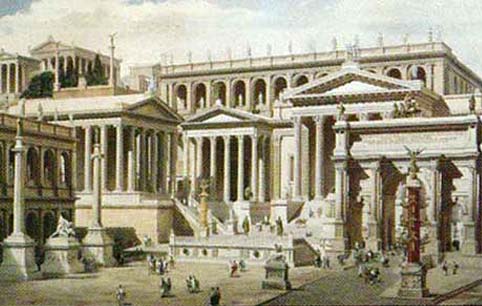
The Effects of Imperial Policy Upon Christian Persecution and the
Development of the Christian Church
by Mr. Bruce Michael Johnson
Ball State University
Muncie, Indiana
© 1980
Revisited and Contemporary Comments Offered
by Senex Magister
Ashburn, Virginia
© 2011

Imperial Forum: ca AD 300
Introduction and Dedication
This paper was first envisioned in the mid 1970's as a possible Thesis to fulfill the requirements of a Master of Arts in Latin with a minor concentration in History. I would complete what some could call a complicated journey before this paper and my MA found a rational end and a culmination to what, at one time, I had hoped would lead to further study and a career in 'Academia' or at least what my naiveté was telling me I had to look forward to as my life unfolded. Naiveté as it usually does takes you into its arms and brings you crashing back to reality.
In December of 1972 I married a very lovely girl whom I had met in Muncie after my discharge from the Air Force and my return to Ball State. The failure of my first marriage I place squarely at my own feet and in hindsight see the manifold mistakes and wrong decisions that I made leading up to my divorce. That was an 'epiphany' that was not immediate but finally my eyes were opened to my immaturity and sole culpability to a tragic period in my life. The loss of love is always difficult for those who experience it, but if we are fortunate it has the possibility of opening new horizons for us. That is what happened to me. I came to Virginia where I was blessed with a 26 year career teaching Latin in public education to which I remain committed. I also met Bobbie Parsons with whom I will celebrate our 32nd wedding anniversary this coming July. When I left Ball State and came to Loudoun County, Virginia where I had accepted a teaching position, all the course work on my degree was completed except for the research hours. I married my wife on July 14, 1979 and was very much aware that the clock was counting to complete my degree. There was a five year dead line from the beginning of a Master's program to its completion, so I had a two year window in which to complete my research and write my paper. It was Bobbie, as it would be so many times in the future, who pointed the way and convinced me that working together on the research that was so critical could be completed. Bobbie and I imposed a difficult schedule upon ourselves. The one advantage that we had was Loudoun's close proximity to Washington, D.C. and more importantly to the Library of Congress. We spent every weekend both Saturday and Sunday as well as Wednesday evenings in the Jefferson Building at the Library of Congress. It is a much larger complex than most people realize who have only seen the very beautiful and elaborate reading room in the foyer of the Library of Congress. As hectic as that schedule was we got the research done and I completed the writing of my paper as well as the typing of it. The most advanced form of technology a student had available was an electric typewriter. I subsequently received my Master of Arts on August 14, 1980. I don't pretend or much less claim that I produced anything close to a scholarly treatise other than relating research available during the 1970's on a subject that can be a hot button issue still today. Religious persecution has no place in a civilized society whether we are looking at the Roman World two millenia ago or a global society as we have now in the 21st Century. Such persecution has occurred in the past and still continues to exist today in varying degrees only with the sanction of political leadership. Politics and religion which should and ought to be separate and distinct from one another has too often become the basis for the repression and subjugation of minority groups, but we can also face the real possibility where the will of a minority can successfully impose itself upon the majority when political and rligious rights are not respected.This Meager Effort is Dedicated to My Wife
Bobbie
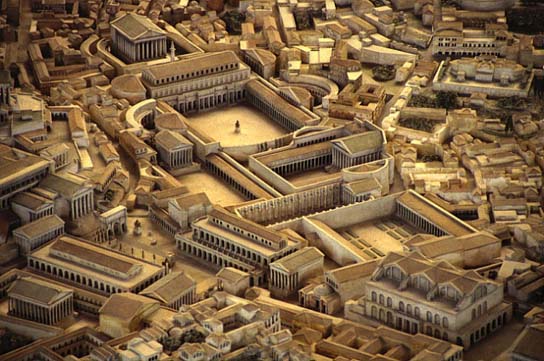
Western End of the Imperial Forum
Table of Contents
I. The Roman Attitude Toward Religion and Foreign Cults
II. First and Second Persecutions: Nero and Domitian
III. Precedent Set by the Correspondence of Trajan and Pliny
IV. The Intervening Years: Hadrian to Maximin
V. The Decian and Valerian Persecutions
VI. The Great Persecution and Constantine
VII. Imperial Policy and Persecution: Conclusions
Addenda:The Roman Principate: 31 B.C. - A.D. 324
THE ROMAN ATTITUDE TOWARD RELIGION AND FOREIGN CULTS
Christianity came into a world in which conflict was inevitable. A religious theology which could transcend both national and political boundaries was alien to the Roman mind. The Roman attitude toward foreign cults and the development of the Imperial Cult as Emperor Worship were probably the initial factors which would bring the Roman State and Christianity into conflict. The attitude of many Christians toward Rome was directly related to this conflict from its very conception. Many Christians of the first generations after the crucifixion saw Rome as the embodiment of "idolatry" and the power of the Empire as the power of the Antichrist. The overthrow of the Empire would presage a Millennium anticipated in earthly terms and the martyr's death would contribute to this end.i Even if one is able to pass over the political implications of treason, this general attitude, which I believe went through a considerable evolutionary process, left very little room if any for coexistence.
Religious consciousness and attitude was the basic problem which faced both Rome and the Christians. An understanding of the Roman attitude is essential to understanding how the conflict evolved. Roman religion was essentially and before all things a national religion; its object was primarily not the honor of the gods, but the safety of the state, for which the good will of the gods was supposed to be the necessary condition.ii The Roman Republic had a great deal of pride in the respect and devotion given to its ancestral religion. About 150 B.C., Polybius said, "the religious devotion was the one outstanding mark of superiority which Rome possessed." The nature of the conviction allowed that superiority. There was no difference whether it might be called a doctrine or a superstition by someone. The importance of this conviction was the devotion and reverence which was given by the Romans to the gods. Cicero also points out this same attitude in his De Natura Deorum (II, 3.8):
Et si conferre volumus nostra cum externis, ceteris rebus aut pares aut etiam inferiores reperiemur, religione, id est cultu deorum, multo superiores.
"Moreover, if we care to compare our national characteristics with those of foreign peoples, we shall find that, while in all other respects we are only the equal or inferior of others, yet in the sense of religion, that is reverence for the gods, we are far superior."iii Religio, pride in and devotion toward gods, was the basic truth. It need not be a particular god or rite, but it was seen in the nature of a contract containing inherent responsibility. The Pax Deorum, the peace and protection which the worship of the gods brought to the Romans, had an element of a treaty involved in it. As long as the gods were given worship and devotion, the safety and welfare of the people were secure.
Cotta points out another element which is very important in understanding the context of the Roman attitude toward religion. Cotta, a religious skeptic, found that he could accept mos maiorum, tradition, as the sole rationale of religious conduct. "If we reject devotion toward the gods, good faith and all association of human life and the best virtues, justice, may also disappear." Religion and the preservation of the Roman State were intimately connected.iv
The same attitude of obligation by every Roman to the deities of the state religion can be found in other ancient writers. Livy in his history, Ab Urbe Condita, (V, 16, 11) writes that in 397 B.C. during the war against the Veii, the Delphic Oracle informed the embassy from Rome that a condition for success was the restoration of the traditional cults in the old style. He went on to say that all went well so long as the Romans obliged the gods and ill when the Romans spurned them.
Iamque Romani desperata ope humana fata et deos spectabant, cum legati ab Delphis venerunt, sortem oraculi adferentes congruentem responso captiui vatis: "Romane, aquam Albanam caue lacu contineri, caue in mare manare suo flumine sinas; emissam per agros rigabis dissipatamque riuis exstingues; tum tu insiste audax hostium muris, memor quam per tot annos obsides urbem ex ea tibi his quae nunc panduntur fatis uictoriam datam. Bello perfecto donum amplum victor ad mea templa portato, sacraque patria, quorum omissa cura est, instaurata ut adsolet facito."v
Horace also presents this attitude (Odes III, 6, 1-8):
Delicta maiorum inmeritus lues,
Romane, donec templa refeceris
aedisque labentis deorum et
foeda nigro simulacra fumo.
Dis te minorem quod geris, imperas:
hinc omne principium, huc refer exitum.
Di multa neglecti dederunt
Hesperiae mala luctuosae.
Though guiltless you may be of your father's sins,
You shall atone, O Roman, until at last
You have restored the fanes, the falling
Shines of the gods and their smoke blacken statues.
Because you hold yourselves less than gods, you rule!
From them trace all beginning, to them each end.
The gods, neglected, have brought down on
Sorrowing Italy much misfortune. vi
Thus the gods were seen as the ultimate guardians and preservers of the state.
Augustus the first of the Roman Emperors tried with minimal success to emphasize traditional Roman values along with the worship of the State Gods.
The Ara Pacis or Pax Augusta is a Representation of the Abundance the Gods
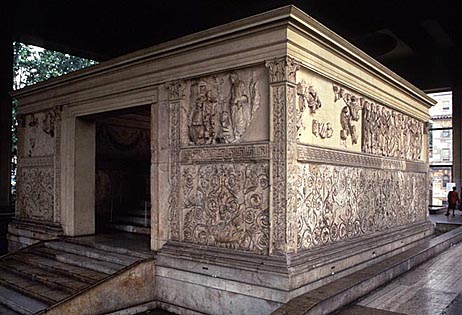
Ara Pacis - Exterior
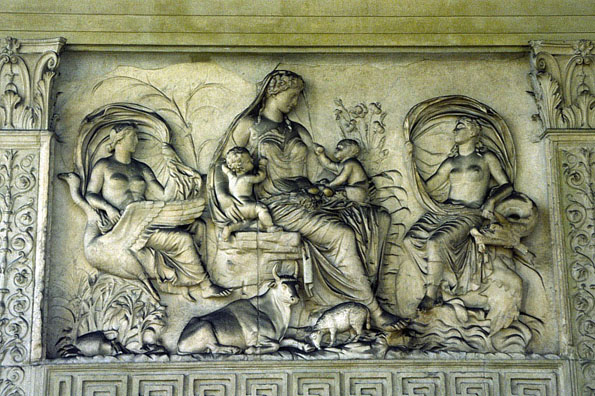
Wearing a chiton (a gown or tunic) that emphasizes her breasts and abdomen, the figure also is veiled with a headband of flowers and fruit. Her lap contains fruit as well, all to emphasize the fertility associated with the goddess. A sheep and cow rest at her feet. Poppies, ears of wheat and lilies appear in the background. The two chubby children which she nourishes represent the Roman people symbolically.
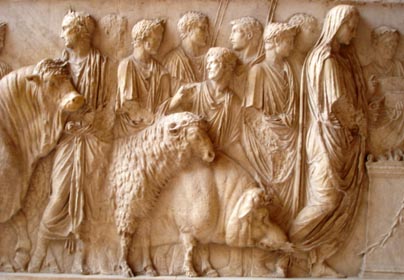
In Augustus's own words, at the beginning of the section of the Res Gestae in which he prides himself on having restored peace to the Roman commonwealth:
When I returned from Spain and Gaul, in the consulship of Tiberius Nero and Publius Quintilius, after successful operations in those provinces, the Senate voted in honor of my return the consecration of an altar to Pax Augusta in the Campus Martius, and on this altar it ordered the magistrates and priests and Vestal Virgins to make annual sacrifice.
Since religio was viewed essentially in national terms, it had more of a patriotic conception than a spiritual one. The worship of foreign deities was permitted by the Romans on the basis of tribe, nationality, and tradition with the exception that it was neither offensive to the Roman people nor their gods. Thus Roman religious policy had two basic principles: The exclusiveness of a national religion and the comprehensiveness inherent in all polytheism. vii Religion was licita, externa, or prava. Religion would then be permitted as licita; it would be foreign or outside the state religion as externa, or it would be perverse or offensive to the customs of the Roman people as prava. A Roman only worshiped Roman gods. Because of the national connotation which religio had, an act of devotion to an alien god was an act of devotion to an alien state. Such an act was atheistic since such worship was outside of the state religion, and thus this worship would be treasonous. This does not mean that religio externa was not permitted in Rome or her provinces. The rulers of the empire would never have entertained the idea of depriving these far distant subjects of their gods; and evidently they carefully abstained from the attempt. viii
There was, however, a transformation over time from religio externa to licita, and from externa to prava. Augustus recognized the Jewish faith on the basis of antiquity and nationality, but this acceptance did not carry over to converts. Livy tells us that after the Carthaginian arrival in Italy in 205 - 204 B.C., the Senate introduced the cult of the Phrygian Great Mother Cybele into the city. This was the first time that a native cult from outside of Greece or Italy had been introduced into Rome. By 191 B.C. Cybele had her own sanctuary on the Palatine. However, until the reign of Claudius, a Roman citizen was forbidden to take part in the processions and dances by the Phrygian Priests. To prevent disorder among the Roman people, the Senate believed that these rites should be conducted by Phrygian Priests and not by Romans. It was thus essential to control religion through the Senate. ix Suetonius in his book on Claudius indicates that there was a transformation from externa to prava. In referring to Claudius, Suetonius says:
Druidarum religionem apud Gallos dirae immanitatis et tantum civibus sub Augusto interdictam penitus abolevit.
He utterly abolished the cruel and inhuman religion of the Druids among the Gauls, which under Augustus had merely been prohibited to Roman citizens. x Yet through a process of religious evolution and acceptance, there were some gods that became licita and even part of the Roman Pantheon. There had to be a basic polytheistic orientation and tolerance which would not be in conflict with the state religion. Monotheistic Judaism and Christianity did not possess this tolerance. Their God was the God of creation and all other gods were false gods.
The Senate was the organ within the Roman government which dealt with claims of divinities. In religious matters the Senate was normally very conservative and would compel a Roman citizen to confine himself to the worship of the gods of the state. Deities of the state religion were divided into two distinct categories. They were either dii indigetes, old gods, or they were dii novensiles, newly admitted divinities usually not permitted within the pomerium of the city. The Pomerium was the sacred boundary within which only dii indigetes were admitted. It was assumed in all cases that the god, by being admitted to Rome, lost his former nationality and became strictly Roman. xi

Marcus Tullius Cicero
There is some evidence among ancient authors to support the view that the worship of unauthorized divinities was forbidden. Cicero in his De Legibus points out: "Let no one have gods separately; nor let them cultivate in private new and strange gods unless publically summoned." He goes on later to say, "What follows not only concerns religion, but the general order of the state; namely, the prohibition which restrains individuals from offering sacrifices without the superintendence of public ministers of religion."
Quod sequitur vero, non solum ad religionem pertinet sed etiam ad civitatis statum, ut sine iis, qui sacris publice praesint, religioni privatae satis facere non possint. xii
The political fears which were often associated with foreign cults can be seen in Dio Cassius. Dio has Maecenas talking to Augustus about duty in 29 B.C.:
"Therefore, if you desire to become in truth immortal, act in the way, following our father's belief and compel others to honor it. Those who introduce strange ideas about it you should both hate and punish not only for the sake of the gods, but because such persons, by bringing in new divinities persuade many to adopt foreign principles of law from which spring up conspiracies." xiii This was not an unnatural fear especially when one remembers that the Roman government before the Principate had been an oligarchy.
The nature and structure of Roman government during the Republic has a direct relationship to the appeal of foreign cults. Since the Republic was a government of the minority, its national religion was also supported by the minority which was on the whole indifferent to the masses and the subject classes. xiv As a result there was a desire by some individuals for a more personal and subjective religion which they believed could be found in foreign cults.
For a more complete understanding of Rome's attitude toward foreign cults, one must take into consideration the great immigration in the second century, B.C. The immigrants formed collegia for religious and self-help reasons. Priests with clandestine aims were especially feared by Rome. They lived in mass blocks very similar to the ethnic ghettos of early twentieth century America. Julius Caesar in 48 - 40 B.C. made efforts to control them and only bona fide associations such as Jewish Synagogues were permitted. The Senate especially paid attention to associations with religious overtones. They feared that religious disorder could easily be transformed into social revolution.
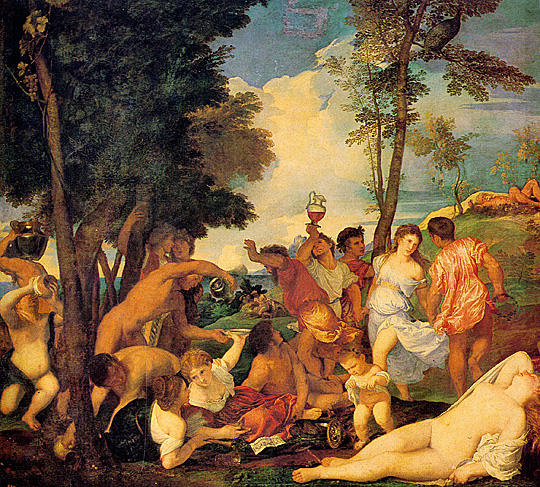
Titian's 16th Century Depiction of the Bacchanalia
Livy gives us evidence of this fear in his description of the Bacchanal conspiracy of 186 B.C. The Bacchanalia was of Greek origin and was originally a small association of women. Livy tells that under the leadership of a Campanian priestess it degenerated into large scale nocturnal orgies and even into secret murders and poisoning. The scandal arose when Roman nobles were implicated in these rites. As a result, the Consul Spurius Potumius Alfinus was asked to investigate the Bacchanalia. The aims of the Bacchanalia were considered as including burning the city and seizing control of the state. The leaders of the conspiracy were assumed to be from the Roman Plebs.
Livy's account of a speech given by Potumius to the Senate gives us insight into Roman attitudes towards foreign cults:
"Nulli umquam contioni, Quirites, tam non solum apta sed etiam necessaria haec sollemnis deorum comprecatio fuit, quae vos admoneret hos esse deos, quos colere venerari precarique maiores vestri instituissent, non illos, qui pravis et externis religionibus captas mentes velut furialibus stimulis ad omne scelus et ad omnem libidinem agerent."
"Never for any assembly has this prayer to the gods been not only suitable, but even so necessary a prayer which reminds us that these are the gods whom our forefathers had appointed to be worshiped, to be venerated, to receive our prayers, not those gods who drive our enthralled minds with vile and alien rites, as by the scourges of the Furies, to every crime and every lust." xv
Livy goes on later to say:
"Nihil enim in speciem fallacius est quam prava religio. Ubi deorum numen praetenditur sceleribus, subit animum timor, ne fraudibus humanis vindicandis divini iuris aliquid immixtum violemus."
"Nothing is more deceptive in appearance than a false religion (prava religio). When the authority of the gods is put forward as a defense for crime, there steals upon the mind the fear that lest punishing human misdeed we may violate something of divine law that became mixed up with them." xvi
In the Roman view, nothing endangered religion more than when sacrifices were performed by foreign ritual. This was especially true when flagitia, crimes, were associated with the rites. The flagitia were usually nocturnal rites, and orgies and secret murders were signs of a prava religio. At a later point these flagitia were also to be associated with Christianity.
With the development of the Emperor Cult, a new element was introduced which would have far reaching implications for Christianity. The Emperor Cult was a product of and evolved from the Pax Romana. For some time, the Mediterranean had been subjected to war. Augustus had brought this to an end with his defeat of Antony at Actium. After the Battle of Actium in 31 B.C. the prominent Roman emotions seem to have been guilt and relief. The Romans had seen a mistake in omitting to carry out religious observances dutifully. In A.D. 384, Symmachus used the same arguments when he pleaded for the restoration of the Altar of Victory by claiming that when religion is affronted the whole state suffers and disaster ensues. xvii Augustus realized the importance and the need to revive interest in the worship of ancestral gods. At the same time, Augustus also knew the importance of linking such a revival to the imperial family and the mission of Rome. Thus we see Apollo going from the god of healing to the god of peace and civilization. Mars, as the father of Romulus, also becomes the god of just war instead of civil war and disorder. With peace also came the building of roads and the growth of commerce. The Emperor was a spontaneous expression of gratitude to one who had saved and benefitted his subjects by establishing peace and prosperity. The development of the Emperor Cult was a product of and not a part of Augustus' religious program.
The development of the Emperor Cult was actually a simple process. The first step was the deification and worship of Julius Caesar by the state. The next step was when the gods of the imperial family began to be worshiped by other families and later officially by the state. The final step in this process was the evolution from worshiping the Genius (divine double) of the master of the household to the homage paid by the whole state to the Genius of the living emperor. All of this was encouraged and permitted by Augustus. xviii
The development of the Emperor Cult did not take the same form throughout the Empire. In the east, Augustus was worshiped as a god and often associated with the goddess Roma. These eventually became the essential elements of the national religion. However, the Emperor Cult in the West worshiped his genius rather than the living emperor at first. Augustus was deified after his death just as Julius Caesar had been. The cult of the imperial genius provided a bridge between the Roman Concept of divinity and authority of Augustus and the Hellenistic concept of the divine kingship. xix The Emperor's birthday became the chief festival of the cult. Offering sacrifice to the emperor's genius also became very important in a symbolic sense. The sacrifice was seen as an act of loyalty. Maybe even more important, this relationship had a centralizing and unifying effect on the Empire. It also had its effect on Christians when they were asked to make sacrifice. These conflicts were only occasional until the third century. This was not a problem with the Jews though. The Jews could and did offer prayers and sacrifice in the Temple on behalf of Augustus and his successors. xx
(Politics and Religion as well as the distinction between what is considered political or religious would bring Rome and Christianity into conflict with neither fully understanding the other. What, I think, is important for the modern student to remember: a sacrifice to the genius of the emperor was essentially a loyalty oath to the State/the government itself. In the Roman mind atheism was synonymous with treason.)
Senex Magister
Back To The Top
FIRST AND SECOND PERSECUTIONS: NERO AND DOMITIAN
The first evidence of any Christian persecution by the Roman government comes during the reign of Nero in A.D. 64. We know of no persecution by the government until 64, and there was no general persecution until that of Decius in 250. Between 64 and 250 there were only isolated, local persecutions; and even if the total number of victims was quite considerable, most individual outbreaks must usually have been quite brief. xxi Orosius, in his Historiae Adversos Paganos, claims that there were ten persecutions from Nero to Maximin II. Yet, Martin P. Nilsson points out in his Imperial Rome that the persecution under Decius in A.D. 250 was the first systematic, empire-wide persecution of Christians. The policy of early emperors toward Christians had no real impact upon limiting or destroying its growth. On the surface, it almost appears to have been a policy of containment or indifference until the Christian Church had practically become a state within a state. Dr. B.W. Henderson, in his Five Roman Emperors, states: "No Roman Emperor between Nero and Decius can justly be assigned any prominent place upon the sinister role of religious or ecclesiastical fanatics. History has proved from time to time that persecution, if through and relentless, has achieved its object. It is the half measures which failed. The early Church owed some measure of gratitude to the Roman Emperors themselves. xxii
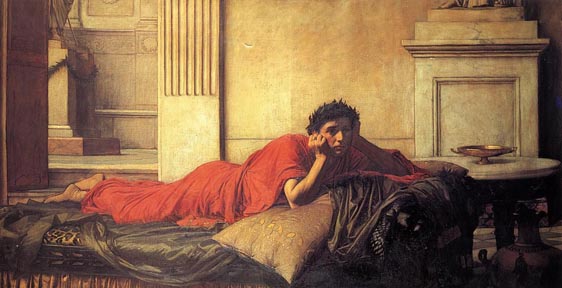
The Remorse of Nero after Killing his Mother, by John William Waterhouse, 1878.
Evidence of the persecution under Nero is found in both Suetonius and Tacitus. Suetonius, in his Lives of the Caesars, said:
"Afflicti suppliciis Christiani, genus hominum superstitionis novae ac maleficae."
"Punishment was inflicted on the Christians, a class of men given to a new and mischievous superstition." xxiii
Tacitus in referring to the Fire of Rome and the Christians said:
"Igitur primum correpti qui fatebantur, deinde indicio eorum multitudo ingens haud proinde in crimine incendii quam odio humani generis convicti sunt."
"First, then, the confessed members of the sect were arrested; next on their disclosures, vast numbers were convicted, not so much on the count of arson as for the hatred of the human race." xxiv Tacitus is much more informative to us in his Annales about the nature of the persecution than Suetonius is.
Many uncertainties over this persecution under Nero exist. Modern historians question whether or not Nero started the fire in Rome. In any event, Tacitus does indicate it was popularly believed that Nero had been responsible for the fire and the destruction it had caused. The emperor was aware of the necessity to remove himself from any suspicion or blame for the fire. The only way in which this could be done was to find a person or persons guilty of burning Rome. There was already a great suspicion and prejudice towards a new sect known as the Christians. There is even a precedent for this in Suetonius' book on Claudius (XXV) when he states:
"Iudaecos impulsore Chresto asssidue tumultuantis Roma expulit."
"Since the Jews constantly made disturbances at the instigation of Chrestus, he expelled them from Rome." xxv Nero found in the Christians a scapegoat which would be accepted by the populace of Rome, and it was also a group that could become the object of their rage.
There is no actual evidence of an official prohibition against Christianity at this time; though a Christian still would have been guilty under the Augustan Law of Association (only sanctioned religions were permitted). Christianity was held in contempt by most Romans of this time. It was a religion whose adherents met at night and in secret. These two elements had definite meanings for the Romans. The Romans believed that a group which did not meet during the day in public view was either a cult with political designs or one which practiced cannibalism and murder. Roman officials now were just beginning to recognize the difference in them. Judaism, with its national character, had a mechanism for self-control built into it. There could be problems within its own national boundaries, but the effects elsewhere would be minimal. On the other hand, Christianity welcomed all races and was far more dangerous to the Roman mind. There was also another element involved which made it easier for the Romans to place guilt of the fire on the Christians. Christ's second coming with its attendant conflagration of heaven and earth was expected at any time, almost daily, by the Christians. The livid denunciation of the Apocalypse (Revelations) were not already written, but apocalyptic spirit was already present in the Church. xxvi
It became evident that a charge of arson was, and would continue to be, much more difficult to prove. Charges of crimes (contra genus humanum) against the human race would be much easier. It must be remembered that the genus humanum referred to those men who lived according to Roman manners and law. The rest of mankind was either enemies of Rome or barbarians. W. M Ramsay in his The Church in the Roman Empire A. D. 170, in referring to the Christians says, "They introduced divisions into families, set children against their parents, and this end they attained by nefarious means, working on the minds of their devotees by magical arts." xxvii Mr. Ramsay also points out the punishment inflicted on the Christians under Nero are those ordered for magicians. That is the odium humani generis which was the crime of poisoners and magicians. It is very relevant to understand this was the attitude of the mass of the people in Rome in A.D. 64. This was a moral issue in the minds of the Romans, and an issue, if unchecked, that could threaten the foundation of their society. This was fully understood, I believe, by Nero; and he used it for his purposes.
Tacitus emphatically says, and Pliny afterwards attests, the judgment of the mob on the origin of the fire was not permanently blinded: Nero was the real culprit, and not those miserable victims. xxviii This attitude of the people brought the persecution into another stage. There was no doubt that the Christians deserved to be punished because of the crimes they were assumed to have committed. The people began to believe that the persecution was not being carried out for the common good but to satisfy the desires of Nero. It was the extremeness and severity of the persecution which brought about this change in public opinion. This change of attitude by the people could not logically be ignored by Nero. The persecution was probably at an end when Nero left Rome towards the end of A.D. 66 if not before. When Nero's personal influence was withdrawn, the persecution can hardly have continued. Flavius Sabinus, who was prefect of the city at the time, was not a person likely to urge it on actively, when the populace was opposed to it. xxix
The primary importance of the persecution in A.D. 64 was that Nero had established an imperial policy for the persecution of Christians. This precedent could be used by provincial governors when needed. There is no evidence that there was any official edict issued at this time or prior to it against the Christians. There was no need as we have already seen because Christianity was a secret, alien sect and thus illegal. The question has been raised as to what was the charge or the offense of which the Christians were guilty. Was it the name of being a Christian which constituted guilt or was it the crimes against society which were associated with Christianity? When Tacitus says that the Christians were convicted, not so much on the count of arson as for the hatred of the human race, one could infer that it was the crime and not the name of which the Christians were guilty. This point and distinction has been drawn from Tacitus, but it seems to be a narrow one. The name and the crimes were one and the same thing. To be a Christian was to be guilty of and a practitioner of this crime. Another important aspect of Nero's persecution is that there is no evidence that the test of emperor worship was used. The application of this test became a standard practice of imperial policy in cases against Christians. What does the absence of this test indicate to us? It might be insignificant, but there are some conclusions that can be drawn as to the nature of this persecution. It was an isolated incident resulting from the Emperor's need to find someone responsible for the fire. It would not have served Nero's purpose to pardon victims of a crime for which he was believed to have been responsible. Yet, the stage was set for further conflict between the Roman Government and Christianity.
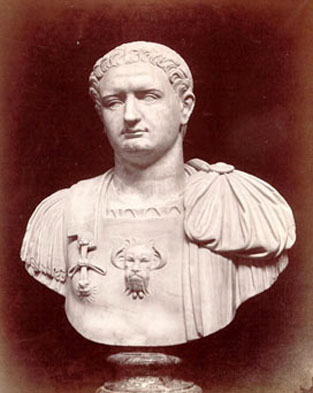
Domitian
Attempting to establish a specific point in time when the Roman Government was able to make a distinction between Judaism and Christianity is very difficult, if not possible. This distinction must have resulted over a period of time from dealing with both groups, and they themselves must have made the distinction for Rome. There are some who believe that the confusion lasted up to the time of Trajan and Pliny. Dio Cassius, speaking in this context, thinks it is certain that the Christians were considered by the Roman Government to be a mere sect of the Jews down to the reign of Domitian; or even if their existence was known, the same regulations applied to them as to the Jews. xxx It must be remembered that at this time, contempt was held towards both Christians and Jews alike. Sulpicius Severus, a fourth century historian who carefully used Tacitus, has given us a little broader look at the Flavian attitude toward these two religions. In referring to the council of war held after the capture of Jerusalem he says, "Titus, himself, expressed the view that the Temple especially ought to be destroyed, in order that the religions of the Jews and the Christians might be more completely destroyed; for these religions, though opposed to each other, had yet the same origin. When the root was torn up, the stem would easily be destroyed." xxxi This cannot be seen as a complete and independent distinction between the two. Titus is presented as having the view that the Christians, though different, were a sect of Judaism. They were a sect in the sense that the Christians were tied, in his view, to the Temple in Jerusalem just as much as the Jews were.
The end of the Jewish War of A.D. 67-70 brought Rome much closer to being able to make the distinction between Judaism and Christianity. The Fiscus Iudaicus was an annual tax of two drachmas which was paid by all Jews to the Temple in Jerusalem. After the war, this tax was transferred to Iuppiter Capitolinus in Rome. This was the cost the Jews were forced to pay for peace with Rome. After the reign of Nero, and later in Domitian's reign, finances became a major concern of imperial policy. As a result of this, the emperor took great care to see that this tax was collected, as Suetonius bears witness for us:
" Praeter ceteros Iudaicus fiscus acerbissime actus est; ad quem deferebantur, qui vel improfessi Iudaicam viverent vitam, vel dissimulata origine imposita genti tributa non pependissent. Interfuisse me adulescentulum memini, cum a procuratore frequentissimoque consilio inspiceretur nonagenarius senex an circumsectus esset."
"Besides other taxes, that on the Jews was levied with the utmost vigor that, those were prosecuted who without acknowledging that faith yet lived as Jews, as well as those who concealed their origin and did not pay the tribute levied upon their people. I recall being present in my youth when the person of a man ninety years old was examined before the procurator and a very crowded court, to see whether he was circumcised. xxxii
In the process collecting this tax, Domitian became aware that there was a large number of people who had converted to Judaism and of course among this number were Christians who lived as Jews. Domitian finally decided that religious control was far more important than any amount of revenue that might be collected. Judaism by birth was still tolerated as long as the tax was paid, but conversion to Judaism was strictly forbidden. It was in this indirect way that the Roman Government came into conflict not only with Judaism but also with Christianity. This persecution was against those who followed the Jewish way of life without the justification of race. xxxiii It is at this point that Rome began to recognize that Christianity was independent and separate from Judaism.
Domitian is known as the second persecutor of Christians. This persecution is of importance because members of the imperial family suffered from it. Dio Cassius mentioned that both Flavius Clemens, consul in A.D. 95 and cousin of Domitian, and his wife, Flavia Domitilla, niece of Domitian, were tried on a charge of sacrilege. Dio goes on to mention that persons against whom this charge was brought had gone astray after the manners of the Jews. xxxiv Clemens was sentenced to death and Domitilla was banished to the island of Pontia.
There are two passages in Suetonius which have given us a different perspective on this persecution. In referring to Domitian's execution of Clemens, Suetonius says:
"Denique Flavium Clementem patruelem suum, contemptissimae inertiae, cuius filios etiam tum parvulos successores palam destinaverat abolitoque priore nomine alterum Vespasianum appellari iusserat, alterum Domitianum, repente ex tenuissima suspicione tantum non in ipso eius consulatu interemit. Quo maxime facto maturavit sibi exitium."
"Finally he put to death his own cousin Flavius Clemens, suddenly and on very slight suspicion, almost before the end of his consulship; and yet Flavius was a man of most contemptible laziness and Domitian had openly named Flavius' sons, who were then very young, as the successors, changing their former names and calling the one Vespasian and the other Domitian. And it was by this deed in particular that he hastened his own destruction." xxxv There can be found here an implication of treason on the part of Clemens or at least suspicion of it on the part of Domitian.
Emperors of the first century had a fear of conspiracy arising from the Roman nobility. This fear does not seem unjustified when one considers the history of the period, especially after the death of Nero. Suetonius also mentioned men from the nobility who were put to death for treason:
"Complures senatores, in iis aliquot consulares, interemit; ex quibus Civicam Cerealem in ipso Asiae proconsulatu, Salvidienum Orfitum, Acilium Glabrionem in exilio, quasi molitores rerum novarum; ceteros levissima quemque de causa."
"He put to death many senators, among them several ex-consuls, including Civica Cerealis, at the very time when he was proconsul in Asia, Salvidienus Orfitus, Acilius Glabrio while he was in exile - these on the ground of plotting revolution, the rest on any charge, however trivial." xxxvi At a later point in this same chapter Suetonius mentioned that Domitian had expelled all philosophers from Rome and Italy. The philosophic temperament of the time was closely connected with the preservation of the memory of the old Republic, and with thoughts of freedom and unwillingness to submit to despotism. xxxvii
The Romans always feared that conspiracy and revolution could break out from secret religious associations, among them the Christians. When members of the imperial family could be implicated in such an association, this fear could quickly turn into an imperial crisis in the mind of the Emperor. The religious policy of Domitian was purely political. The Emperor gave a great deal of attention to restoring the national religion to the position it had held under Augustus. Domitian believed that refusal to comply with the prescribed form of respect to the Emperor was a refusal to be a member of the Roman Unity, and constituted disloyalty and treason. A large number of Christians must have died under Domitian but there were many others who were not Christians who also suffered. Suetonius also mentioned one other point concerning the imperial family. Stephanus who had been a freedman of Domitilla was one of the Emperor's assassins. Domitilla was subsequently recalled from exile by Nerva. The new Emperor also put an end to the Fiscus Iudaicus. It should be emphatically noted that Domitian's attack on Christianity was an attack on a foreign religion and was a reaffirmation of the principle established by Nero.
(I believe the actions of both Nero and Domitian were purely political and religion was used to create a scapegoat for the people to allow the political establishment to further its own agenda. It is not a phenomena but a political reality which is as true today as it was in the Roman World.)
Senex Magister
Back To The Top
PRECEDENT SET BY THE CORRESPONDENCE OF TRAJAN AND PLINY
A letter written to Trajan by Pliny in A.D. 112 while he was governor of Bithynia and Pontus gives us much insight in the official policy toward Christians up to the time of the first general persecution under Decius in A.D. 250. Trajan had sent Pliny to restore order to a province which had suffered from the lack of proper administration. On his arrival in Bithynia and Pontus, Pliny quickly became aware of a religious problem in the province. Since he had been sent to the province to restore order, Pliny realized the necessity of rigidly enforcing the procedure against Christians. The procedure that was used was quite simple. The governor put the question to them three times as to whether they were Christians, while at the same time threatening them with punishment. When they persisted in their confession, Pliny condemned to death those who were provincials, while those who were Roman citizens he ordered to be transported to Rome to await the Emperor's decision. xxxviii
Pliny the Younger
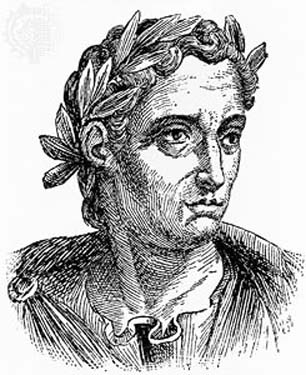
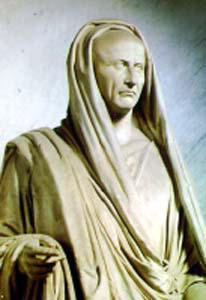
Pliny had used the proper procedure which had been established by previous precedent in dealing with Christians. However, these first trials brought about further accusations against Christians. Some of those accusations had also been anonymous. Pliny was faced with a much more complex problem when he questioned the defendants who at once denied the charge. There were also others who after being threatened by the governor admitted they had been Christians, but they no longer practiced the faith. All of these defendants offered sacrifice before a statue of the Emperor and cursed the name of Christ. At this point Pliny became indecisive as to what was the proper course of action. Therefore he wrote to Trajan for advice and direction concerning the persecution of Christians.
"Ideo nescio quid et quatenus aut puniri soleat aut quaeri. Nec mediocriter haesitavi, sitne aliquod discrimen aetatum, an quamlibet teneri nihil a robustioribus differant; detur paenitentiae venia, an ei, qui omnino Christianus fuit, desisse non prosit; nomen ipsum, si flagitiis careat, an flagitia cohaerentia nomini puniantur."
"I therefore do not know what offences it is the practice to punish or investigate, and to what extent. And I have been not a little hesitant as to whether there should be any distinction between young and old; whether pardon is to be granted for repentance, or if a man has once been a Christian, it does him no good to have ceased to be one; whether the name itself, even without offenses, or only the offenses associated with the name are to be punished." xxxix
Pliny's last question is helpful to us in more clearly understanding the Governor's own attitude toward Christians. He asks the Emperor whether the name itself without the associated crimes or the crimes themselves should be punished. The destructive crimes of a prava religio to society had been assumed, so why does Pliny find it necessary to ask such a question? It was part of the problem which faced him after questioning the accused and also prompted him to ask for advice from Trajan. Pliny first of all from those who recanted, and afterwards from two deaconesses (who being slaves, were examined under torture), learned that the rites of the Christians religion were simple and harmless, that their discipline forbade all crimes, that the worshippers bound themselves by a sacramentum to do no wrong, and that the charges commonly brought against them of practicing child murder, cannibalism, and other hideous offences at their private meetings were false. xl Then if this was the true nature and character of Christianity, did Pliny believe that Christianity should be prosecuted? This idea could never have entered Pliny's mind. He was aware of the political nature of Rome's national religion and how it was, in his mind, the fabric which held the empire together. A foreign religion whether it was harmless or not was still a threat to patriotism and loyalty which constituted the unity of the Roman World.
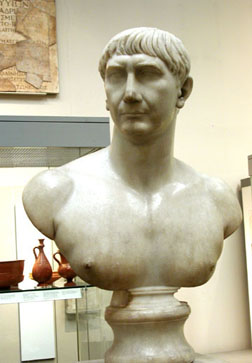
Trajan
Trajan's response to Pliny's letter established an imperial policy which forms Rome's basic attitude toward Christianity up to the time of Decius. Trajan begins by saying there are no general rules that could be set down for the many cases, but his original procedure was correct in assuming the name Christian deserved punishment. However, Trajan goes on to say:
"Christiani conquirendi non sunt; si deferantur et arguantur, puniendi sunt, ita tamen ut, qui negaverit se Christianum esse idque re ipsa manifestum fecerit, id est supplicando dis nostris, quamvis suspectus in praeteritum, veniam ex paenitentia impetret. Sine auctore vero propositi libelli
"Christians must not be sought out, and anonymous denunciations are to be ignored, for they create the worst sort of precedent and are quite out of keeping with spirit of our age. Christians who are accused as such, in due form by a private prosecutor and are convicted must be punished, but anyone who denies he is a Christian, and proves it by offering prayers to our gods, is to receive pardon and go free." xli
Delatores believed denunciation alone would bring about prosecution, but there was a problem of law. A basic principle of Roman Law was that an acknowledged accuser must initiate the trial and face the accused. With the Roman sense of law, it was difficult for the Romans to initiate the type of persecution which could have effectively destroyed Christianity
Trajan must have researched the imperial archives and used existing precedents towards Christianity and other foreign religions in preparing his response to Pliny. The Emperor leaves no doubt that the name, just being a Christian, is a crime in itself. This point is at a more developed stage than it was during the reign of Nero, but the fact that being a Christian and what was assumed in the name essentially remained the same. Trajan's indifference or vagueness in his language is far more important. It is apparent that Trajan had no desire to make a break with or change any existing principle of imperial government. Yet, at the same time, he does not seem to desire to have the principle rigidly enforced. As a result, one could assume that Trajan, possibly through his indifference, was establishing a policy of leniency. This attack on Christians could hardly be called a persecution. It was one of other sporadic outbreaks which happened from time to time. However, it was very important as far as the precedent it established.
At this point it would be helpful to take a brief look at the legal form or system under which Christians were tried. It was called Contio Extra Ordinem, and took place before the governor as the emperor's representative in the provinces. There is evidence that such trials as these also took place before the Praefectus Urbi or the Praefectus Praetorio, but this was very rare. In making use of this system the magistrate concerned had very wide discretion. This discretion extended not only to fixing penalties, but also in deciding which cases the magistrate would recognize as criminal. xlii The right of judicial cognitio belonged to all provincial governors as part of their imperium. The sphere in which the judge might exercise his discretion was actually at its widest in the early Principate, before it began to be circumscribed by imperial constitutions issued more and more frequently from Hadrian's reign and beyond. xliii Momsen in referring to the Cognitio system says, "Its very essence was being a legalized absence of a settled form." Momsen also maintains that the persecution of Christians was a standing matter, as was that of robbers during the Flavian Dynasty. However, some governors made more or less energetic attempts to carry out completely the fundamental principle which proscribed both, while others made little or no attempt to cope with either. There were also governors who boasted that they had brought back from their province their lictor's ax unstained with blood. xliv
Yet, this discretion which the cognitio system possessed could and did help protect the Christians. Even Tertullian attests to this fact in his Ad Scapulam:
"Vespronius Claudidus who dismissed from his bar a Christian, on the ground that to satisfy his fellow citizens would break the peace of the community. Asper, who in the case of a man who gave up his faith under slight infliction of torture, did not complete the offering of sacrifice, having owed before, among the advocates and assessors of the court, that he was annoyed at having had to meddle with such a case. Pudens, too, at once dismissed a Christian who brought before him, perceiving from the indictment that it was a case of vexatious accusation; leaving the document in pieces, he refused so much as to hear him without the presence of his accuser, as not being consistent with imperial commands. xlv A governor was only limited by those constitutiones and mandata which were relevant in his area and were still in force.
(I will comment more on this later. What is critical to see at this point is that Trajan essentially establishes a policy of toleration when the Christian Church was an urban institution making it visible and vulnerable to attack by an emperor. Peace and order became greater concerns to Roman Emperors.)
Senex Magister
Back To The Top
THE INTERVENING YEARS: HADRIAN TO MAXIMIN
From the time of Trajan until the Decian Persecution of the third century, the primary concern of the Principate toward Christianity was to maintain law and order. A Christian still could be prosecuted and convicted for just being a Christian, but this was to be avoided as much as possible for the sake of peace in the community. This principle had been established by Trajan in his correspondence with Pliny. Under Hadrian the policy of avoiding confrontation and prosecution of Christians became more fully developed. The governor of Asia, Serenus Gratianus, wrote to Hadrian, probably in A.D. 123 asking for instructions on what actions should be taken when accusations were made against Christians. Trajan had told Pliny that Christians were not to be sought out. Hadrian clearly reaffirmed this policy, especially in connection with accusations that might be lodged against Christians, in his response to Gratianus' successor, Minicius Fundamus.
"I have received a letter from your illustrious predecessor Serenus Gratianus, and I do not wish to leave his inquiry unanswered, lest innocent men be troubled and false accusers seize occasion for robbery. If the provincials clearly are willing to appear in person to substantiate suits against Christians, if, that is, they come themselves before your judgment seat to prefer their accusations, I do not forbid them to prosecute. But I do not permit them to make more entreaties and protestations. Justice demands that if anyone wished to bring an accusation, you should make due legal inquiry into the charge. If such an accusation be brought and it be proved that the accused men have done anything illegal, you will punish them as their misdeeds deserve. But in Heaven's name, take the very greatest care if a man prosecutes anyone of these men by way of false accusation you visit the accuser, as his wickedness deserves, with more severe penalties." xlvi
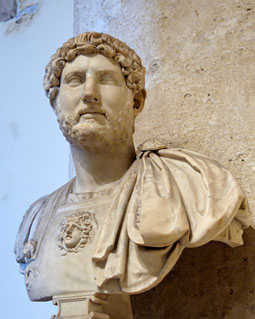
Hadrian
This rescript, if it can be considered that, has created a great deal of controversy. Hardy, in his Christianity and the Roman Government, asserts that Hadrian had abolished punishment for the name. This conclusion, however, extends the importance of Hadrian's letter too far. It is clear that Hadrian was inclined to be much more tolerant, but beyond that there is nothing to indicate that the Emperor was making any basic change as to the status of Christianity as an illegal religion. There still was and continued to be a great deal of popular prejudice against Christians. Hadrian appeared to be more concerned that popular prejudice and hatred against any group of people within the empire could be a threat to peace. Yet, Christians had to be thankful to Hadrian for the precedent his letter set, as Henderson points out: "Even to accuse another of the name was risky. Suppose he denied it. What would the prosecution's fate be unless he could prove that he had brought the charge in good faith, and the burden of proof would lie on him." xlvii
Another factor that showed there was a greater atmosphere of toleration was the emergence of the first Christian Apologists. These were men who made reasoned arguments to the Roman Government in defense of Christianity. It would have made no sense to present such apologies to the Emperor, unless it was believed by the Apologists that the Emperor might be favorably inclined toward them. However, it would be a serious error to assume that Christians did not suffer during the reign of Hadrian. The very fact that the Emperor found it necessary to write to Fundamus indicates that Christians were not free from possible prosecution. The emergence of the Apologists could also be viewed in the same light.
The Principate of Hadrian also brought about increased hatred of Christianity on the part of the Jews. Uprisings broke out among Jews who had been dispersed from Palestine at the end of Trajan's reign. Roman generals had suppressed these uprisings in Mesopotamia, Egypt, Cyprus, and Cyrene. Possibly because of this Hadrian is credited with issuing after his return from Egypt in A.D. 131 an edict prohibiting circumcision. There is doubt over this edict since it would be almost impossible to enforce and seems inconsistent with the nature of Hadrian. However, because Antonius Pius withdrew it, it must have been in existence. xlviii In A.D. 130 the Emperor issued orders for Jerusalem to be refounded as a Roman colony and renamed Aelia Capitolina. Hadrian also ordered that a temple of Iuppiter Capitolinus be built upon the site of the Temple of Yaweh. There can be little doubt that all this helped directly to cause the Jewish Rebellion of A.D. 132.
Eusebius tells us that Barchochebes attempted to unite both Jews and Christians against the Romans. Eusebius also said:
"The Christians had been wise enough to resist his advances and remained loyal to Rome in spite of the persecution and torture with which he tried to force them to revolt." xlix
Upon their defeat in A.D. 135, Jews were forbidden to enter Jerusalem except once a year. This restriction was not imposed upon Palestinian Christians among whom were many Gentiles. The Christians had no reason to revolt against a government which had already begun to take a more tolerant stance toward them. Yet, it had been and continued to be not uncommon for accusations to be made against Christians by Jews.
The reign of Antoninus Pius is believed by most Christian sources to have been a continuation of the policies of Trajan and Hadrian, and a period of relative calm for the Christian Church. It was a period of growth for the structure and organization of the Church, but individual Christians were not free from persecution. While the general tendencies of Imperial Government might bind succeeding emperors, the personal feelings of one emperor would end with his death. l The basic contradiction of Christianity to the state, national religion remained. To be a Christian was still to be atheistic and outside of the unity of Rome, thus disloyal and treasonous. This point of imperial policy and Roman Law had not changed and would not change.
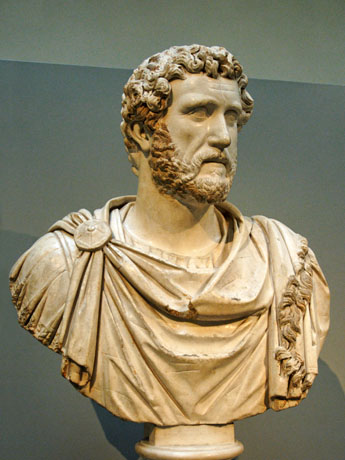
Antoninus Pius
Eusebius has indicated that Antonius Pius forbade mob action against Christians. These rescripts were allegedly sent to the Assemblies of Athens, Larissa, and Thessalonica. They were probably general orders based on the fear that riots might break out in Greek cities. This document is disputed and may be a forgery. It is found in Eusebius' Ecclesiastical History (IV, 13) immediately following Justin's to Antonius Pius and Lucius Verus. Eusebius also maintains that it was used by Melito, Bishop of Sardes, in his Apology to Verus. There were earthquakes in Asia Minor around A.D. 152 which might have prompted action against the Christians. Outbursts against Christians were to follow national disasters for the next century. li
Antonius Pius did attempt to raise the prestige of Rome's traditional religion and reestablish it in both the minds and spirits of his subjects. Even though he had Hadrian deified, he was not closely tied to the Imperial Cult nor did he encourage it. The general policy of the government was to follow the policy of Trajan and Hadrian of non-interference. This can be evidenced by the very existence of a Church organization both in Rome and throughout the empire. Attacks that were made upon Christianity were directed not against Christian organizations, but against individual Christians. lii Eusebius had also indicated that the Christian Church was suffering from heresies introduced by Valentinus, Cerdo, and Marcion. The very fact that there was division within Christianity is another indication that the Church was not seriously suffering from state persecution. This divisiveness was to be a recurrent problem within Christianity in later decades when the unifying influence of persecution was temporarily lacking. However, there were some persecution s during this current period. Telesphorus, Bishop of Rome, died in the first year of Pius' reign. There was also a persecution in Rome under the Praefectus Urbi, Lollius Urbicus. Very notable was the martyrdom of Polycarp in Smyrna. At the end of Antonius Pius' Principate, Marcus Aurelius came to the throne, and a turning point arose in the relationship between the Roman Government and Christianity.
During the period of Marcus Aurelius' reign, renewed hatred of Christianity arose. The citizenry broke out in sporadic persecutions. What caused this change in attitude among the people? It had its roots in traditional attitudes of giving proper reverence and worship to the gods of the state. Throughout his reign, Marcus Aurelius was almost constantly at war. The Emperor was forced to deal with foreign invasion and civil unrest. The empire suffered from famine, plague, and floods which also contributed to a financial crisis within the empire. The popular belief was that problems such as these resulted from the anger of the gods. There was also a reemergence in the minds of the people of the crimes that had always been associated with Christians. Fronto, who had been a tutor of Marcus Aurelius, attacked the morals of the Christians. In referring to the secret meetings of the Christians, Minucius Felix Octavius said, "After a lot of feasting, when the banquet has wound up and a passion of incestuous lust and drunkenness has flared up, a dog tied to the lamp is incited to jump and leap by throwing a little cake to it beyond the reach of its tether. When they put the light out, the guests began their hideous orgies, Fronto proclaimed." liii This same attitude can be detected in Marcus Aurelius' Meditations (III, 16): "To have the intelligence that guides to the things which appear suitable belong also to those who do not believe in the gods, and who betray their country, and do their impure deeds when they have shut the doors." liv
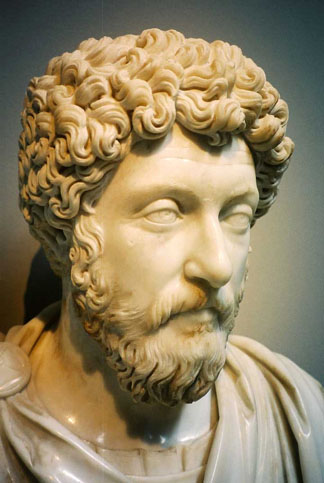
Marcus Aurelius
Despite his stoicism, there can be no doubt that Marcus Aurelius viewed Christianity as atheistic and a threat to the peace and order of the empire. Because of his deep belief in the traditional religion, Marcus Aurelius could have held no other attitude toward Christianity. There is one specific and revealing reference to Christians in the Meditations (XI, 3): "How wonderful is that soul which is ready, if it must be at this very moment released from the body, either to be extinguished or to be scattered, or to survive. This readiness must come from an individual decision, and not out of a sheer spirit of resistance like the Christians." lv Birley has pointed out in his study, Marcus Aurelius, that the Emperor must have felt Christians were willing to suffer death not out of personal choice but because they had been trained to die. The Romans could never comprehend and fully understand the obstinacy that they found in Christians. lvi Pliny even remarked that he felt the Christians deserved punishment for that if for no other reason. lvii
(I wrote this paper approximately thirty years ago, maybe a little more than that but not much. It appears Marcus Aurelius looked upon Christians who were prepared to face martyrdom not that much differently than we look upon radical suicide bombers today. Do we treat detainees at Guantanamo any differently than the Romans treated Christians? Was it a question of religion or politics? However we attempt to answer this question, I think we place ourselves in a moral dilemma just as the Romans did when faced with an intransigent opponent.)
Senex Magister
The primary concern of the government was still to maintain peace and order. There is no evidence to indicate that Marcus Aurelius encouraged attacks on Christians. An action of this type would have only created more disturbances within a troubled empire. However, when charges were brought against Christians, they of course had to be tried. Christians still had the privilege of pardon if they denied their faith and offered sacrifice to the gods of the state. Refusal to do so was a capital offence.
(I had a priest for a number of years who maintained that we are living in a Post Christian Culture or is it a post religious culture where faith and belief have no place and value. Is a Christian able to live a life based on the demands for Social Justice found in the New Testament? Can we look beyond the prejudice and indifference of partisan politics and live a truly religious life? If Religio is the basic truth, as the Romans believed, and we profess that basic truth that is articulated so well in Scripture and especially the New Testament, how can we refuse to live a life that heals marginalized lives of the poor, the homeless, the disabled, and those who are denied a voice in a society that seems to only value greed and their privileged brethren.)
Senex Magister
With the death of Marcus Aurelius in A.D. 180, his son, Commodus, came to power. Marcus Aurelius has been criticized by many for not leaving the empire in better hands, but it is generally agreed that this was done to prevent civil war in the year 180. Civil War would break out in A.D. 193, which eventually brought Septimius Severus to power. Persecution was again resumed, and Septimius is claimed by Christian sources with issuing the first formal edict against Christians. Granted that protests by Tertullian against persecution of this period seem to indicate that some must have occurred. The purported edict, which would date from about A.D. 200, made conversion to either Judaism or Christianity illegal. It seems highly unlikely that such an edict was ever issued. There was no need for any such edict as far as the Christians were concerned because to be a Christian was already a capital offense. Such an edict would imply that Christianity had not previously been proscribed.
Septimius Severus was succeeded in A.D. 211 by his son, Caracalla. Tertullian, as an interesting footnote, claimed in his Ad Scapulam that Caracalla was raised by a Christian nurse. When Caracalla extended Roman citizenship to almost all free inhabitants of the empire, he made the Christians more vulnerable to general persecution. As citizens they could now be forced to recognize the gods of the state and participate in the Imperial Cult. On the whole though, during the Severan dynasty, the Christians suffered very little. This quasi toleration ended with the death of Alexander Severus in A.D. 235. After Alexander was assassinated, Maximin was brought to power by the army. Eusebius tells us that Maximin issued an edict against the leadership of the Church. However, there is no evidence of large scale persecution of Church leaders during this period. Maximin's edict was not enforced by his successors. The Christian Church enjoyed a period of Peace under Gordian III and Philip until Decius came to power in A.D. 249. It is under Decius that the first systematic empire-wide persecution took place.
Back To The Top
THE DECIAN AND VALERIAN PERSECUTIONS
At the beginning and early part of the third century, popular animosity towards Christianity remained constant. The Christian was viewed, moreover, by the Roman aristocracy as a possible revolutionary. Ordinary citizens of the empire also regarded Christians as atheists, and as such were held culpable when any type of disaster occurred in the empire. It is not coincidence that this period saw a reaffirmation of the Imperial Cult and traditional Roman discipline.
The emperor was seen as the representative of the divine from which all goodness and prosperity came to man. This essential Roman attitude regarding the divine had not changed, and was the basic ingredient which would bring about the first general persecution of Christians.
(At this juncture it might be helpful to go back to the first chapter of this paper: Roman Attitude Toward Religion and Foreign Cults. I am not looking for a change in mind and attitude toward Rome and the Romans from a Christian perspective, but I am hoping for a greater depth in our understanding and appreciation of the Roman point of view. The first chapter is essential to everything that follows it. Yet, at this point I would only suggest that you consider what I had to say concern the Pax Deorum and Mos Maiorum.)
Senex Magister
Such a persecution was also facilitated by Caracalla's Constitutio Antoniniana of A.D. 212 by which almost all ordinary provincials had been made citizens. There was no reason on the part of Roman officials to believe at this time that if a general sacrifice to the gods was ordered in a time of danger and disaster to the empire there would be resistance to it. This, of course, would carry serious implications and dangers for Christians of the early third century. At this time Christianity was an urban institution. It had not been successful in attempts to grow and spread in the rural countryside. Since it was an urban organization, it would therefore make both leaders and followers more conspicuous and vulnerable.
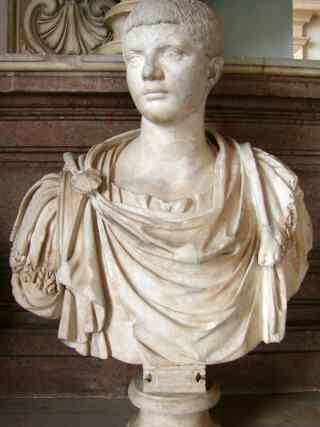
Alexander Severus
Beginning with the reign of Alexander Severus, the Roman World had seen an increase in the number of successes of enemies threatening its borders. Sassonids came to power to power in Parthia in A.D. 226, replacing a dynasty which had been friendly to Rome. It was their expressed vow to replace Roman rule in Syria, Asia Minor, and Egypt. Toward the end of Alexander's reign, the Franks and Alemanni on the Rhine were also threatening Rome's borders. It was in consequence of these threats, in fact, that Maximin was able to seize power from Alexander. The situation did improve under Maximin but by A.D. 248, Rome again was being threatened by barbarians. In A.D. 248 the danger came from the Goths across the Danube. This situation helped to pave the way for Decius to replace Philip. At a later point, it became popularly believed the disasters under both Alexander and Philip resulted from their friendliness and toleration towards Christians. Emperors like Maximin and Decius represented Rome and her traditional values. They suspected that Christians did not support the perceived traditions and thus were a danger to Rome and her empire.
After the death of Philip at Verona, Decius was proclaimed emperor by the army in September of A.D. 249. Decius was commander of the Danube Army and a rival emperor of Philip. Decius, in his attempt to revive the state religion and traditional Roman discipline, appointed Valerian to the old Republican office of Censor. Decius did this to emphasize his friendly relationship with the Senate, and his need to have a trusted representative at Rome while he was at the front. Valerian was primarily appointed to administer the Decian reforms which were a reaffirmation of the state religion.
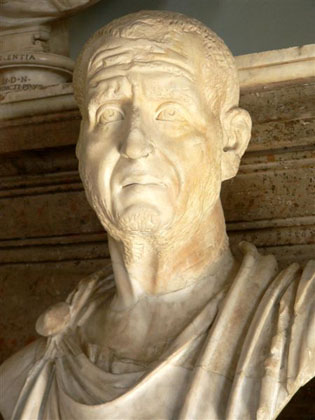
Traianus Decius
A short time after Decius returned to Rome at the end of A.D. 249, he issued an edict or edicts against Christians. The exact provisions of Decius' actions have not been preserved, but there is enough contemporary evidence from this period to give us a general understanding of the nature of the Decian persecution. It appears to have had two stages: The first was directed against the Church's leadership, the second against the general membership of the Church. We do not know if these were separate and distinct measures. Most likely, both were incorporated into a general edict and occurred simultaneously. Examples of the first stage include the following: Pope Fabian was tried before the Emperor himself, and was executed; Bishop Babylas in Antioch and Alexander in Jerusalem were also executed; Origen was imprisoned in Caesarea and eventually died in prison; and Bishop Euctemar in Smyrna renounced his faith instead of facing martyrdom. W.H.C. Frend, in his The Early Christian Church, says that actions against Christian leaders could be viewed as a purge of elements supporting the previous imperial regime, just as Maximin's actions in A.D. 235 had been directed against his predecessor's adherents. lviii The issue was clearly broader, however, than merely the elimination of supporters of a previous emperor. The primary purpose of the persecution was the destruction of elements within the empire that were viewed as divisive or disloyal - seditious, in other words. This was the view held towards Christianity by the government under Decius. Furthermore, the second stage itself of the Decian persecution indicates that the government was concerned with more than just supporters of a previous emperor
Orders were issued, probably in June of A.D. 250 that all free citizens of the empire were to offer sacrifice to the gods of the state religion. This sacrifice must have also included sacrifice to the genius of the Emperor himself. The purpose of this stage of the persecution apparently was to expose all Christians and force them to renounce their creed/faith. lix Decius thought that common recognition of the state religion would increase the solidarity of the empire. The general sacrifice ordered by the Emperor could be viewed in a modern sense as a loyalty oath to the government.
(I have talked about the Roman conception of the 'Divine' before. Yet, there is an important distinction to realize about the imperial cult. Citizens were not being asked to sacrifice to the emperor as a god but to his genius. It is difficult to explain much less understand. The Romans believed everyone possessed a divine double which is more similar to the Egyptian 'ka' than the Judaic Christian concept of the soul. However, they did not believe that the living reigning emperor was a god. To make a sacrifice to the genius of the emperor is no different than when we ask government official and members of the military to swear that "they will protect, defend, and preserve the Constitution of the United States".)
Senex Magister
Commissions were set up throughout the empire to supervise these sacrifices. Census and tax rolls were used by the commissions to identify those who were required to comply with the terms of the sacrifice. A Libellus or certificate of sacrifice would be issued upon completion of the sacrifice. Many of these certificates have survived, and give some indication as to the nature of this phase of the persecution: "To the commission chosen to superintend the sacrifices at the village of Alexander's Isle. From Aurelius Diogenes, son of Satobous of the village of Alexander Isle, aged 72 years, with a scar on the right eyebrow. I have always sacrificed to the gods, and now in your presence in accordance with the edict I have made sacrifice, and poured libation." lx This was a typical petition to which then the commission would certify that the sacrifice had been completed.
This stage of the persecution had disastrous effects upon the Christian Church. There was still a very strong prejudice against Christianity, especially among the middle class who filled the magistracies. One must also recall that the Church at this point was primarily an urban institution, so its leadership and membership on the whole were known or suspected by the rest of the community. There were many who fled, renounced their faith, or swore that they had never been Christians. There were also other Christians who either through friends or willing officials were able to purchase certificates. These were known as libellactici, and they were to create serious problems for the Church when they petitioned for readmission to the Church. Eusebius, in his Ecclesiastical History, recounts a letter from Dionysius of Alexandria to Fabius of Antioch which showed the disorganization that this edict caused the Church.
And what is more, when the edict arrived, and it was almost like that which was predicted by Our Lord, well-nigh the most terrible of all so as if possible to cause to stumble even the elect. And of the more eminent persons, some came forward immediately through fear, others in public positions were compelled to do so by their business, and others were dragged by those around them. Called by name they approached the impure and unholy sacrifices, some pale and trembling, as if they were not sacrificing but rather to be themselves the sacrifices and victims to the idols, so that the large crowd that stood around heaped mockery upon them, and it was evident that they were by nature cowards in everything, cowards both to die and to sacrifice. But others ran eagerly towards the altars, affirming by their forwardness that they had not been Christians even formerly; concerning whom the Lord very truly predicted that they shall hardly be saved. Of the rest, some followed one or other of these, others fled; some were captured, and of these some went as far as bonds and imprisonment, and certain, when they had been shut up for many days, then forswore themselves even before coming into court, while others, who remained firm for a certain time under tortures, subsequently gave in. lxi
(I think this is another moment for a belated editorial comment. I am doing something that I always told my students to avoid if they wished to gain a true understanding of the past. There was an undeniable political context to this struggle which was shrouded in religion which had a greater national and cultural persona than, I believe, exists today. What I find disturbing is the use of torture to compel information acceptable to the state. Is this an early form of rendition? Probably it is not but, it is a governmental process that leaves a bad taste in your mouth, so to speak, during any age of man.)
Senex Magister
Decius' policies were initially very successful. Also there is no evidence to indicate that large scale imprisonment and executions were necessary to affect conformity to the edict.
Christianity was not the only problem with which Decius had to deal. The Goths were still threatening Roman territory. The Gothic King Kniva was able to force Decius into the marshes of Abrittus in Dorbrudja where the Emperor was defeated and killed in June of A.D. 251. With the death of Decius and the end of his personal influence, the Decian policies never regained the force they had under him personally.
The Church now had a short period of peace in which to reorganize. However, it was a period of internal strife for the Christian Church. There were serious questions within the Church as to whether those Christians who had renounced their faith or those who had obtained certificates of sacrifice through bribery should be readmitted to the Church. The chief battle ground was between Carthage and Rome. Evidently the Church was suffering from schismatic growing pains even before there was any official awareness of it. This was not an ideal time for fighting within the Church, but the renewed threat of persecution under Valerian would bring unity to the Church again.
After two short lived emperors, Valerian, who had been Decius' Censor, was proclaimed emperor in A.D. 253. The first four years of Valerian's reign were a time of comparative peace for the Christians. However, external forces were again to bring Rome and Christianity into conflict. Franks and Goth had crossed the Danube and the Rhine. Pirates were attacking the coasts of Asia Minor and Mesopotamia. Christians along the coast of the Black Sea were openly giving aid to the invading barbarians against the expressed warnings of their bishop. By A.D. 257, the empire was both in a severe economic and military position. There were two edicts issued by Valerian against Christians, one in A.D. 257 and another in A.D. 258. Later Christian writers, attempting to gain the favor of Gallienus, the son and successor of Valerian, tried to place the blame of the persecution on Macrianus, Valerian's finance minister.
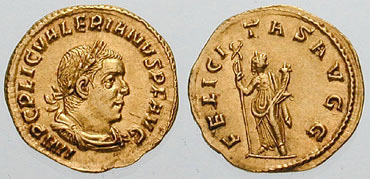
Valerian
Again, Valerian's first edict was directed against Church leaders and clergy. As quoted in W.H.C. Frend's The Early Christian Church, a letter of Cyprian of Carthage indicates that Christian clergy were ordered to acknowledge the official state religion by sacrificing to the gods of the state. Christians were also forbidden to hold services or to come together in cemeteries. lxii Cyprian of Carthage and Dionysius of Alexandria were only deported from their see cities for their defiance of the edict. However, in Numidia, many of the bishops were sent to the mines of Signus. Valerian's edict of 258 was much broader than the first one and this is the one that Macrianus is especially credited for influencing. It was addressed by Valerian to the Senate with instructions for provincial governors. Christian clergy were to suffer immediate execution if they refused to acknowledge the state religion. Members of the Roman nobility, viri egregii, would suffer confiscation of their property and execution. Lower civil servants, caesoriani, would become slaves and be sent to work in the mines or imperial estates. Matronae would have their property confiscated and be sent into exile. Xystus or Sixtus, who was the Bishop of Rome, was arrested and executed just as Cyprian was in Carthage. W.H.C. Frend notes that the persecution continued for another year, and in Africa was probably more destructive in human terms than the Great Persecution forty years later. lxiii
Valerian had begun to realize the real danger to the empire was the threat of the Persian Emperor Sapor in the East. In A.D. 260, Valerian faced superior forces near Edessa and agreed to a meeting where he was taken prisoner. Valerian's son, Gallienus, succeeded his father as sole Emperor. Gallienus issued a rescript of the persecution and also restored lost property to Christian communities in the empire. Gallienus addressed his rescript to Bishop Dionysius of Alexandria who, by this time, had become a powerful force in the Christian Church.
The Emperor Caesar Publius Licinius Gallienus Pius Felix Augustus to Dionysius and Pinnas and Demetrius and the other bishops. I have given my order that the benefit of my bounty should be published throughout the world, to the intent that they should depart from your places of your worship, and therefore you may also use the ordinance contained in my rescript, so that none may molest you. And this thing which is also within your power to accomplish has long since been conceded by me; and Aurelius Quirinus, who is in charge of the Exchequer, will observe the ordinance given by me. lxiv
(It may be too easy intellectually to sit back thirty or more years after writing a paper of this nature and attempt to revise your original thesis. My intention, though it might not be as clearly written with as much erudition as I had hoped, was and still is to show that Ancient Rome was never the antichrist that various quarters of western society has attempted to portray. Some historians specifically as a criticism of subsequent persecutions that were inflicted upon the Christian Church maintain that Gallienus' Rescript was clearly an edict of toleration that future emperors ignored. I disagree with such a suggestion as this. Gallienus was using Christianity as a political football so to speak when the real issue was not religious but political and how to consolidate that political power with the least or minimal disruption to the peace and loyalty of the empire.)
Senex Magister
Gallienus' actions can be viewed as a purely political move. Just as his father, he knew the real danger at this time was in the East. Yet, Gallienus had a greater appreciation for the strength of the Christian Church in the East. At the same time, Macrianus was attempting to establish himself as a rival emperor but failed in his effort. Gallienus was attempting to affect public opinion and support for himself. The new Emperor knew that his position and that of the empire had to be stabilized if disaster was to be avoided. Gallienus had made the position of Christianity more secure for awhile but also more obscure. He had not made it licita, but he had set a precedent by stating the Christian Church was capable of proprietary rights. Gallienus ushered in a period of almost forty years of peace and prosperity for Christianity. Gallienus and the emperors that followed him were more concerned with stabilizing the frontiers of Rome territory than with the status of Christianity. The Christian Church was not to be seriously threatened again until the reign of Diocletian.
Back To The Top
THE GREAT PERSECUTION AND CONSTANTINE
The question that has faced historians for many years is why, after forty years of at least quasi toleration, was persecution of Christianity resumed under Diocletian. Nineteen years had elapsed between the time Diocletian assumed power in A.D. 284 and the resumption of persecution in A.D. 303. This is a question that cannot easily be answered.
By the end of the third century the empire was near collapse. The primary concern of emperors from Gallienus through Diocletian was the restoration of frontiers and of Roman unity. Prior to A.D. 303 Diocletian's basic challenge was stabilizing the government of the empire and making it more efficient. In his view a stable government would be the greatest safeguard for the security of the empire. This challenge brought about reforms in the army, provincial administration, and currency. An additional concern of Diocletian was the dislocation caused when rivalries for imperial power emerged within the empire. This had been a chronic problem throughout Roman History, and usually led to civil war. The Emperor believed that this resulted from the impracticality and impossibility of one man ruling such a vast empire. In order to resolve this problem, Diocletian decided to share the responsibility of governing the empire by appointing Maximian as his Caesar in A.D. 285. His responsibility was to govern the Western Provinces. By March of A.D. 286, Diocletian raised Maximian to the position of a joint co-equal Augustus alongside him. This system which became known as the Tetrarchy was more fully developed in A.D. 293, when each Augustus appointed a Caesar to rule under him. Diocletian chose Galerius as his Caesar and Maximian chose Constantius. Each Caesar was also given a share of responsibility in governing the empire. Galerius was to watch and guard the Danube frontier while Constantius was to govern Gaul and Britain.
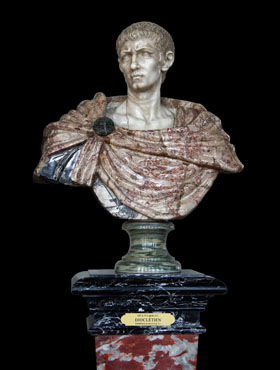
Diocletien
To emphasize the unity which was so important to the empire or at least in the minds of the Augusti, the Tetrarchy began to associate itself with traditional Roman discipline and religion. In religious matters Diocletian maintained a conservative policy by looking back to a former age of the old virtues of Rome. He rebuilt temples and revived pagan cults. This attitude can be seen in an edict concerning marriage, De Nuptiis, issued in A.D. 295. "Incest was displeasing to the immortal gods. The Roman people had prospered thanks to their respect for traditional morality. The favor of the gods must not be lost because some of the inhabitants of the Empire, whether through ignorance or through the prescription of some barbarian savagery, were guilty of contracting illicit unions." lxv This type of language could have been seen three hundred years earlier and also indicated the importance that Diocletian placed on traditional Roman morals. Duchesne has stated, in this context that the emperor was viewed as sacred, divine, eternal; and his house was also the domus divina. lxvi The same implication can be seen in Diocletian taking the title of Iovius. The Emperor had by means of that associated himself with the Father of the Roman gods and thus Rome itself.
This period also produced a very able Neo-Platonist defender of Paganism, Porphyry of Gaza. Through his criticism of Christianity, he attempted to point out inconsistencies in scripture dealing with life of Jesus. He went to great length portraying both Peter and Paul in the poorest light possible. However, like Celsus, his real charge against the Christians was their lack of civic responsibility, their unscrupulous efforts in converting the underprivileged, especially women, and their hostility toward the state. lxvii Neo-Platonists such as Porphyry possibly had influenced Diocletian to some degree, but the intellectual health of the empire was far too weak for their arguments to have much affect on the empire as a whole.
(I really don't believe the status of Christianity to the Roman State was a philosophical question much less a religious one. Political unity in a culturally diverse empire was a difficult goal to achieve. Reverence to the state religion was more a political statement of loyalty to the government than it was a religious act of worship.)
Senex Magister
Historians must rely on Lactantius and Eusebius, two Christian writers, for much of their information concerning this period. However, even with their bias, these two men are able to give us some insight into the origin of this persecution. Lactantius, in his De Mortibus Persecutorum, tells of a sacrifice held before both Diocletian and Galerius in A.D. 298, in which Tagis, the haruspex, was unable to obtain the desired omens. Tagis complained that it was the presence of Christians which had prevented the will of the gods to be known. At this complaint, the Emperor immediately ordered all soldiers to sacrifice to the gods or be discharged. lxviii By A.D. 301, Diocletian had ordered Veturius, Galerius' magister militum, to purge the army of all Christians. Lactantius went on to say that Galerius, along with other advisors, urged Diocletian to take further actions against the Christians. At first Diocletian resisted this as an action that would disrupt the peace and order of the empire. Finally, the Emperor agreed to consult the oracle of Milesian Apollo at Didyma in the Meander valley. The reply which Diocletian received was that the just upon the earth hindered him from declaring the truth and this was the cause of false oracles issuing from the tripod. lxix With this reply, the Emperor finally agreed to take further action against Christians.
(One aspect of Roman religious belief that I have not mentioned yet is the fact that they were extremely superstitious by modern standards. The sophistication of Hellenistic philosophies such as Stoicism that we see in such individuals as Marcus Tullius Cicero or the Emperor Marcus Aurelius on the whole had disappeared with a few exceptions. Oracles and especially those to Apollo date back to Classical Greek. To enlighten the Pythia and enable her to foretell future events, hemp was burned in the tripod which was the catalyst giving her the ability to make her prophesies.)
Senex Magister
It was decided that an edict would be issued on the feast of the Terminalia, February 23, A.D. 303. The edict ordered all copies of the Scriptures to be surrendered and burned, all churches to be demolished, and all meetings of Christians for worship to be forbidden. Early in the morning of the twenty third, the praetorian prefect had the cathedral at Nicomedia destroyed and all available copies of the scriptures burnt. A supplementary edict was issued the following day stating any soldier refusing to obey orders would be subject to torture and execution, no Christian could bring actions in the courts, and imperial freedmen who remained Christians would become slaves. Furthermore, all Christians in public service would be removed from office and lose all privileges of birth and status. G.E.M. de Ste Croix has pointed out this edict was an attempt by the government to stop the collective practice of Christianity, and the edict implies that just being a Christian, if one did not actually practice the religion, was not a crime. lxx Eusebius wrote of many Christians who suffered death in resisting this edict. He also mentioned that Empress Prisca, the wife of Diocletian, and her daughter were forced to sacrifice to the gods. If we can trust Eusebius in this instance, we must then assume the Empress and her daughter were at least suspected of being Christians. This had to have been the case since the edict had not called for a general sacrifice, and the sacrifice test was only used to prove one's innocence.
Another edict was issued, probably in the Spring or Summer of A.D. 303. Lactantius indicated that this was in response to two fires which had been started in Diocletian's palace in Nicomedia. He placed the blame for the fires on Galerius who was of course was blaming the Christians. Lactantius further alluded to an implied a rebirth of the horrors of Nero.
(I think Lactantius has gone a bit too far in manipulating the facts for his own purpose. Most historians today doubt that Nero had anything to do with the fire in Rome in the latter part of the first century. It may be allegorical as Lactantius attempts to present it. I agree with him about the probable role of Galerius but the use of the persona of Nero could only be used to inflame popular prejudices. Nero was often presented as the personification of the antichrist.)
Senex Magister
Also, reports had reached the Emperor of revolution in Syria and Melitene in which Christians were supposedly involved. This was of far more importance to Diocletian than the fire since these areas were crucial to Roman defense against Persia. As a result, the Emperor ordered the arrest of all bishops and clergy. The Roman prison system had been built to hold prisoners awaiting trial and not to hold large numbers for a long period of time. These arrests created a problem of overcrowding in the prisons for Diocletian with which both Decius and Valerian before him had been forced to deal. In an effort to alleviate this problem Diocletian issued a third edict on the twentieth anniversary of his reign which granted pardon to all the clergy who would offer sacrifice. All means available were to be used to compel them to sacrifice to the gods. This program under the third edict was quite successful, to the delight of many Roman magistrates, since only a few Christians faced execution. There is, in addition, no evidence to indicate that provisions of the second and third edicts were ever put into force under Maximian and Constantius in the western provinces. lxxi
In the winter of A.D. 303 and 304, Diocletian had become very ill. He remained in the Danube provinces throughout the Spring and Summer. The Emperor finally returned to Nicomedia on August 28, A.D. 304. Throughout Diocletian's illness, control of the government had been in the hands of Galerius. During this period, probably in January or February A.D. 304, Galerius issued a fourth edict ordering a general sacrifice throughout the empire. Refusal to sacrifice would be punished either by death or forced labor in the mines. At first, the order was enforced only in Galerius' provinces. Eventually, Maximian did the same, and eventually so did Diocletian in February through March of A.D. 305 just before his abdication. Again, however, there is no evidence that Constantius ever enforced this edict. Diocletian had never fully recovered from his illness, and was finally persuaded by Galerius to abdicate. Diocletian's abdication as emperor took place in the presence of his troops in Nicomedia on May 1, A.D. 305. Maximian, who was much more reluctant to yield his power, also abdicated in Milan.
(I want to share a few thoughts about the Tetrarchy which was a well intentioned attempt by Diocletian to govern such a vast empire more efficiently. It had a further purpose and that was to bring about a peaceful transfer of power at the death of one emperor and the ascension of another to the imperial throne. The right of inheritance that would emerge as the standard in later European Monarchies was never an essential part of the Roman Principate. Too often this led to civil war between rival claimants to the imperial throne. Constant civil strife leading to civil war was one of the leading causes in the decline and eventual fall of the Roman Empire. Under the Tetrarchy the Augustus (emperor) was to serve for twenty years then yield his power and position to his Caesar (associate) with the expectation that this system would result in a peaceful transfer of power thus preventing civil war. This was the intention but unfortunately we will see that is not what happened.)
Senex Magister
With the abdication of the former Augusti, Galerius and Constantius were elected (elevated) to the position of Augustus. It had been popularly assumed that the two new Caesars would be Constantine, the son of Constantius, and Maxentius, the son of Maximian. This was not to be the case, for another decision had been made prior to the abdication of Diocletian. W.H.C. Frend, in his Early Christian Church, has written that Diocletian had forsaken the hereditary principle in favor of what he believed to be a military and administrative principle. lxxii This decision of Diocletian was eventually to show that the Tetrarchy had not successfully solved the problem of succession under the Roman Principate. The two new Caesars were Maximin Daza, the nephew of Galerius, and Severus, another Illyrian officer.
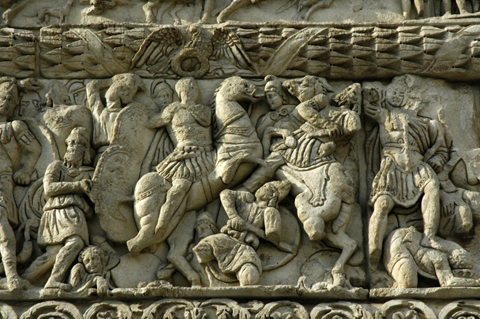
Arch of Galerius
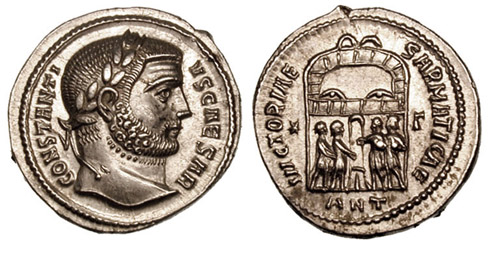
Constantius I
The change in government had resulted in a short period of time without any persecution. Another general sacrifice was now ordered in the Spring of A.D. 306 by Maximin. This was to include every man, woman, and child within the empire. The administration of this sacrifice was more organized than the previous one. Lists were drawn up of those who were required to sacrifice. There is no evidence, though, of libelli being used as there had been under Decius. The use of bribery during this great sacrifice is just as likely as it had been under Decius, although there is no direct evidence. This persecution was especially severe since both Severus in the West and Maximin in the East put their full support behind it. It was only under Constantius that Christians could hope to find toleration of any kind. Significantly, other events were developing which would soon change the entire picture both politically and religiously in the empire.
At the time of Diocletian's abdication, Constantine had been in Nicomedia and Galerius had made sure that he remained there. The following year Constantius asked for the return of Constantine and Galerius at first agreed and then attempted to prevent his return after it was too late. Constantine was able to reach his father before Constantius died at York in Britain on July 25, A.D. 306. On the same day, Constantius' legions proclaimed Constantine the new Augustus. In late A.D. 306 or early A.D. 307, Severus, who had been raised to the position of Augustus after the death of Constantius, was overthrown by Maxentius. The removal of Severus brought an end to persecution for all practical purposes in the West. Maxentius actually only controlled Rome and the area around it which had been ignored for sometime while Constantine controlled all the area which his father had governed in the West. Maxentius proclaimed himself Augustus on October 27, A.D. 307. Galerius was consequently forced to recognize both Constantine and Maxentius as August?. As a result of this, he saw no reason not to do the same for his nephew, Maximin. To make matters even worse, and create more rivalry among the August?, another Augustus was appointed. In hope of strengthening his position, Galerius appointed Licinius, commander of the Balkans, who had been a faithful supporter of his, as another Augustus in November of A.D. 308. Clearly this confused situation could not long endure, and did eventually lead to civil war.
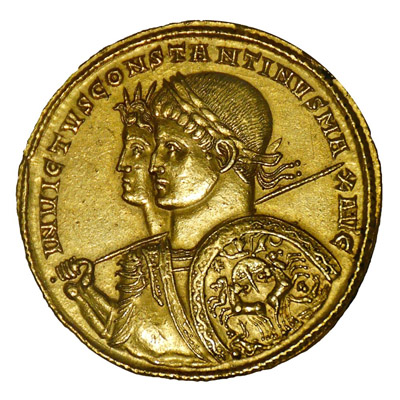
Constantine
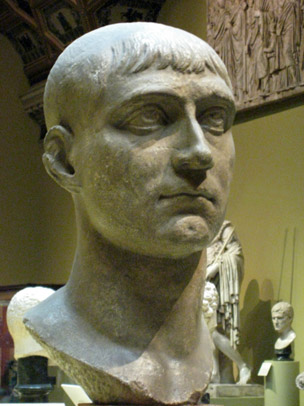
Maxentius
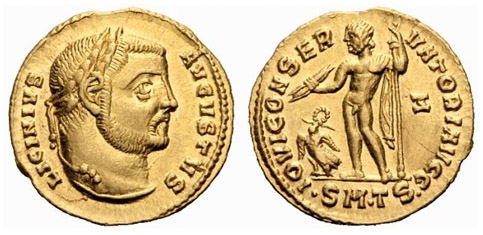
Licinius
In April of A.D. 311 in Serdica, Galerius was stricken with a serious illness. Licinius viewed the persecution of Christians as trivial and disruptive to the empire. Attempting to gain more political power and taking advantage of the situation. Licinius was able to convince Galerius to issue an edict of toleration toward the Christians. It is known today as the Palinode of Galerius.
"Among the steps which we are always taking for the profit and advantage of the State we formerly sought to set all things right according to the ancient laws and public order of the Romans and further to provide that the Christians too who had abandoned the way of life of their fathers should return to sound reason. For the said Christians had somehow become possessed by such obstinacy and folly, that instead of the following those institutions of the ancients which by chance their own ancestors had established, they were at their own will and pleasure making laws for themselves and acting upon them and were assembling in different places people of different nationalities. After we had decreed that they should return to the institutions of the ancients, many were subjected to danger, many too were completely overthrown; and when very many persisted in their determination and we saw that they neither gave worship and due reverence to the gods nor practiced the worship of the god of the Christian, considering our most gentle clemency and our immemorial custom by which we are want to grant indulgence to all men, we have thought it right in their case too to extend the speediest indulgence to effect that they may once more be free to live as Christians and may reform Churches always provided that they do nothing contrary to public order. Further by another letter we shall inform provincial governors what conditions the Christians must observe. Wherefore in accordance with this our indulgence they will be bound to entreat their god for our well being and for that of the State and for their own so that they themselves may live in their homes in security." lxxiii
There is no apparent reason for this change in Galerius' religious policy other than the superstitious nature of the times and possibly his own fear of death. Licinius' motives may be more easily understood. He was probably hoping to gain Galerius' province of Asia Minor which was a good source of recruits for the army. It was also there that Christianity was the strongest. Galerius died a week later after the edict on May 5, A.D. 311. However, Maximin gained control of Asia Minor. Yet, both Constantine and, to a lesser degree Licinius, were to realize the benefit of a pro-Christian position.
The edict which was more of an amnesty had been issued in the names of Galerius, Constantine, Licinius, and Maximin. Maximin had been able to gain Asia Minor for himself by being able to move faster than Licinius. He did not openly break with Galerius' edict, but Maximin realized that with the vague language of the edict, there was room to resume persecution if he wished to do so. In the Autumn of A.D. 311, Maximin was petitioned by cities in the East to resume persecution. Because of the increasing strength of Christianity, especially now in the countryside, a Pagan reaction to Galerius' edict was very likely. Maximin, in his reply, returned to the old rhetoric of prosperity coming to the Roman people whenever they returned to their traditional gods. Persecution was again a policy of the State, at least in the East. Eusebius has given a picture of the severity of the persecution by recounting a report of Phileas, Bishop of Alexandria, to the Christians of Thumis in the Delta.
What account would suffice to reckon up their bravery and courage under each torture? For when all who wished were given a free hand to insult them, some smote them with cudgels, others with rods, others scourges; others, again with straps, and others with whips. And the spectacle of their tortures was a varied one with no lack of wickedness therein. Some with both hands bound behind them were suspended upon the gibbet, and with the aid of certain machines stretched out in every limb; then, as they lay in this plight, the torturers acting on orders began to lay on their whole body, not only, as in the case of murderers, punishing their sides with the instruments of torture, but also their belly, legs, and cheeks. Others were suspended from the porch by one hand and raised aloft; and in the tension of their joints and limbs experienced unequaled agony. Others were bound with their face towards pillars, their feet not touching the ground, and thus their bonds were drawn tight by the pressure upon them of the weight of the body. lxxiv
Whether Eusebius is true or not, the effects of the persecution had to have been noticed by those in the government and populace as a whole. Christians did not seek to avoid persecution as they had under Decius which indicates the extent to which Christianity had grown since A.D. 250. Maximin also suffered a serious defeat in his campaign against the Christian kingdom of Armenia during the Winter of A.D. 311 and 312. Probably as a result of this Maximin called off the persecution in the Spring of A.D. 312 just before he was defeated and killed in A.D. 313.
The final end of persecution and of Maximin had mostly been assured by other events within the empire. By A.D. 310 Maxentius, who was in Rome, realized the threat Constantine presented to him. In hopes of saving his very fragile position, he formed an alliance with Maximin. Constantine then betrothed his sister, Constantia, to Licinius to offset the potential danger that Maximin and Maxentius presented. In the Spring of A.D. 312, Constantine marched on Rome. Constantine feared that Maxentius would hold up in the city and thus necessitate a lengthy siege. However, the guardian of the Sibylline books advised Maxentius to meet Constantine in open battle. Constantine defeated Maxentius at the Battle of the Milvian Bridge on October 27, A.D. 312, and Maxentius drowned in the Tiber. Lactantius has written about this in his De Mortibus Persecutorum. "Constantine was directed in a dream to mark the Heavenly Sign of God on the Shields of his soldiers and thus join battle. He did as he was ordered with the cross-shaped letter x with its top bent over he marked Christ on the shields. lxxv
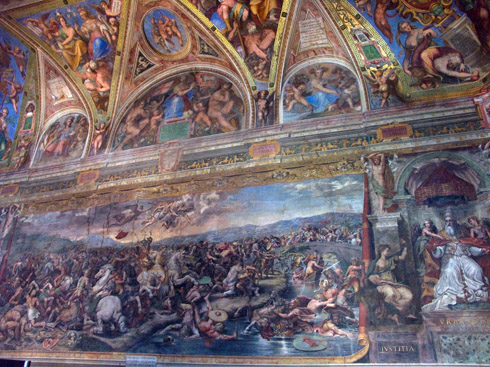
Vatican Apostolic Palace: Battle of the Milvian Bridge
by Giulio Romano
Constantine then marched on to Milan where he met Licinius in February of A.D. 313. Constantine was married to Licinius politically, and both Emperors agreed on a mutual policy of toleration for all religions. Maximin had attempted to aid Maxentius. He had taken Byzantium and was heading into Thrace. Licinius then headed eastward to meet Maximin. Maximin was defeated north of Heracles on the Sea of Marmora on April 30, A.D. 313. Lactantius has written that Maximin escaped and was followed to Tarsus where he poisoned himself. Licinius, on his return to Nicomedia, issued the Edict of Milan on June 13, A.D. 313 in both his and Constantine's names.
"Since we saw that freedom of worship ought not to be denied, but that to each man's judgment and will the right should be given to care for sacred things according to each man's free choice, we have already some time ago bidden the Christians to maintain the faith of their own sect and worship. But since in that edict by which such right was granted to the aforesaid Christians many and varied conditions clearly appeared to have been added, it may well perchance have come about that after a short time many were repelled from practicing their religion. Thus I, Constantine Augustus, and I, Licinius Augustus, had met at Mediolanum (Milan) and were discussing all those matters which relate to the advantage and security of the State, among the other things which we saw would benefit the majority of men we were convinced that the first of all those conditions by which reverence for the Divinity is secured should be put in order by us to the end that we might give to the Christians and to all men the right to follow freely whatever religion each had wished, so that thereby whatever of Divinity there be in the heavenly seat may be favorable and propitious to us and to all those who are placed under our authority. And so by a salutary and most fitting line of thinking we came to the conclusion that we should adopt this policy -- namely our view should be that to no one whatsoever should we deny liberty to follow either the religion of the Christians or any other cult which of his own free choice he has thought to be best adapted for himself, in order that the supreme Divinity, to whose service we render our free obedience, may bestow upon us in all things his wonted favor and benevolence. Wherefore we would that your Devotion should know that it is our will that all those conditions should be altogether removed which were contained in our former letters addressed to you concerning the Christians (and which seemed to be entirely perverse and alien from our clemency) -- those should be removed and now in freedom and without restriction let all those who desire to follow the aforesaid religion of the Christians hasten to follow the same without any molestation of interference. We have felt that the fullest information should be furnished on this matter to your Carefulness that you might be assured that we have given to the aforesaid Christians complete and unrestricted liberty to follow their religion. Further, when you see that this indulgence has been granted by us to the aforesaid Christians, your Devotion will understand that to others also a similar free and unhindered liberty of religion and cult has been granted, for such a great grant is befitting to the peace of our times, so that it may be open to every man to worship as he will. This has been done by us so that we should not seem to have done dishonor to any religion." lxxvi/p>
Christianity has been used for political purposes down to the end. One emperor either favored it or opposed it to further his own ambition. Yet, the Christian Church had been allowed to grow to such an extent that it would be impossible to destroy it completely. Licinius even revived persecution again in his struggle with Constantine for sole power in the empire. This came to an end with the defeat of Licinius at Chrysopolis in A.D. 324. Constantine was both a military strategist and a political pragmatist. He realized that Christianity was supported by a large segment of the people. Periods of persecution and martyrdom since A.D. 250 had done more to strengthen Christianity than to hurt it. At the same time, Constantine could not afford to alienate either the army or the aristocracy. The institutions of the old religion remained, and Constantine himself retained the title of Pontifex Maximus. Mithraism was still very strong among the army, a fact which he could not ignore. Constantine had forbidden the erection of statues of himself, but he permitted the statues of some gods with his own facial features on them. Because of the political nature of religion in the Roman World even at this late date, Constantine was assuming a dual role for himself between the old and the new. However, Christianity did become the de facto religion of the State at the Council of Nicaea in A.D. 325.
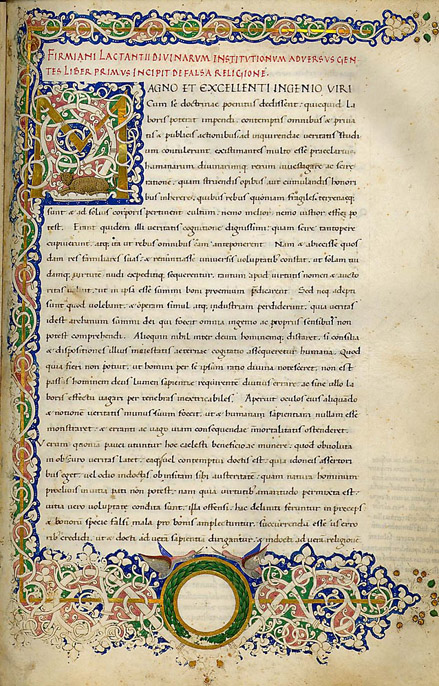
Lactantius: Divinarum Institutionum
(Any of us who have spent any time studying or reading history, I believe, becomes aware that there is a thin cultural line that separates politics and religion. As the one nation that legally institutionalized the Separation of Church and State in the U.S. Constitution the US has allowed different groups throughout our history to take a great deal of time and effort to deny that basic constitutional right and attempt to inculcate the idea that the US somehow is a 'Theocratic Christian State'. I have a hard time with the religious rhetoric from the political right whom with their political agenda has missed the demand for social justice in the New Testament. I would call that person a 'political pragmatist' who has lost touch with the human promise in the Preamble of the Constitution "to provide for the general welfare of the people". Unfortunately there is one aspect of political life that has not changed in two millenia.)
Senex Magister
Edict of Milan:
Greek: Eusebius
Latin: Lactantius
Back To The Top
IMPERIAL POLICY AND PERSECUTION: CONCLUSIONS
Christianity would have been destroyed as a recognizable institution if the Roman Government had adopted a policy to effect its destruction during the first century. There were problems which would prevent this. Christianity was a foreign cult. As such, it was supposed to be controlled and possibly proscribed. Yet, was it a sect of Judaism or independent and different from it? If it was a sect of Judaism, Christianity would have had a right to the same toleration that had been given to Judaism. This was the first fundamental problem which forced Rome into developing a policy toward Christianity. There is no doubt that this distinction was not recognizable to Roman authorities until at least late in the Flavian Dynasty.
It does not appear that, under Nero, Christians were prosecuted for just being Christians, but for the crimes that were associated with that sect as Tacitus pointed out. This is a very fine line by which to differentiate. Yet, Tacitus implies that it was the crimes and not the name of which the Christians were guilty. Tacitus, a friend and contemporary of Pliny, must have been aware of the correspondence between Trajan and Pliny in which the Emperor clearly stated that just being a Christians was punishable. Tacitus was the type of historian who would want to show the period in which he was writing about in its true light and not cloud it with attitudes or prejudices from his own time. However, there was some point between A.D. 64 and A.D. 112 at which this distinction between Judaism and Christianity was made. It must have come sometime after the destruction of the Temple in Jerusalem by Titus. Titus himself associated both Judaism and Christianity with the Temple. Suetonius has indicated that individuals were punished under Domitian for following the manner of the Jews. This might indicate a clearer understanding on the part of the government, but the evidence is not conclusive enough to state it as a fact. This understanding must have been growing under the Flavian Emperors, and it was probably a result of the collection of the Fiscus Iudaicus, the Jewish tax which had been transferred to Rome after the destruction of the Temple in Jerusalem.
There can be no doubt that by A.D. 112 the distinction between Judaism and Christianity was known and understood by the Roman Government. The correspondence between Trajan and Pliny is very important to the study of the rise of Christianity since it established imperial policy which is not actually broken until the time of Decius. There are specific points which clearly define what the relationship between the State and Christianity will be. Trajan explicitly states that being a Christian (the name) is a crime and should be punished. Christianity as an atheistic cult was crime enough whether there were other associated crimes present or not. Trajan also established that the test of sacrificing to the gods of the state could be used to prove one's innocence whether he had once been a Christian or never had been one. The most significant point made by Trajan in his reply to Pliny was that Christians were not to be searched out. Christianity was a foreign cult which needed to be controlled and contained to maintain the peace and order of a specific area and of the empire. It is evident that Trajan and subsequent emperors believed that a large scale prosecution of Christians throughout the empire would have a much greater disruptive effect and would be a greater danger to peace than the mere presence of Christians. When the Principate could have adopted a policy which might have been a death blow to the Christian Church, it showed the wisdom of quasi toleration for the sake of peace in the empire. This attitude of the government actually enabled the Church to grow, so that it was strong enough to survive once general persecutions did occur in the third and fourth centuries. The cognitio system, with the discretion it gave individual governors, in reality afforded Christians a great deal of protection.
The attitude of individual emperors or governors always dictated to what degree actions would be carried out concerning Christians. Legal actions against Christians have been freely referred to as persecutions, but not until the third century was there a systematic effort to do so. When persecutions of Christians occurred, they were usually the result of hostility and prejudice towards a segment of the population. They were sporadic and usually short lived. This was true from Nero on and possibly also to a lesser degree, even under Marcus Aurelius.
As Rome moved into the third and fourth centuries, the empire was going to encounter events which brought about greater conflict between the State and Christianity. Natural disasters, and more importantly the threat of foreign invasions, did create crisis for State. It had always been a traditional belief of the Romans that as long as their gods were given proper worship Rome would survive. The prosperity of the empire depended on the good will of the gods. An emphasis and return to traditional worship would always be called for. The greatest danger then would come from those who were outside of or rejected the traditional beliefs of Rome. This brought about the call for general sacrifices during the third and fourth centuries in which the State and the Church faced their most critical conflict.
The Decian and Valerian Persecutions of the third century came close to success. If it had not been for the untimely deaths of these emperors, the Church might not have been strong enough to survive the Great Persecution of the fourth century. At the time of Decius and Valerian, the Christian Church was an urban institution. It was more visible and thus more vulnerable to persecution. The persecution failed because it was unable to survive (sustain itself) after the deaths of the emperors involved. Even in the fourth century, momentary success or failure of a persecution depended on the attitude of the individual emperor. From the time of Galerius, the issue of persecution was used in hopes of strengthening an individual emperor's position as the Tetrarchy was collapsing. An important change had occurred since Gallienus' restoration of Church property in A.D. 260: Christianity had grown considerably and had even spread throughout the countryside by the time the Great Persecution was initiated. Christianity had also spread into Armenia beyond the boundaries of the empire which made its destruction impossible. Persecution was destined for failure by the very imperial policy which, in a sense, fostered it and allowed it to grow to the point where its political significance had to be recognized by the State.
(There is a part of me that still doesn't understand the divide between Christianity and the Roman State, though I do. There is a level of understanding that can only be known emotionally and not just intellectually. It is quite difficult, I believe, for most people to divorce their intellect from their spiritual essence. We seem to need verifiable, finite proof to accept whatever challenges the reality of Newton's Universe presents. If we cannot allow 'Faith' that is separate and independent from political governments, we doom ourselves to this process of religious persecution which too often, I am afraid, means political persecution. The Edict of Milan recognized Christianity on the same basis of other religions, but it was the Emperor Theodosius in A.D. 380 who made Christianity the official religion of the Roman Empire. The historical tragedy of that act was to reverse the roles of the victims and perpetrators of religious persecution. I still have to believe that 'Faith' will provide the balance that separates us from the forces that seem to need to find scapegoats to justify perceived truth. Such an epiphany would also liberate religious life in all the different dimensions and expressions from the apparent need for individual political power in any of its various forms in the world today. The tragedy of politicizing religion was to allow political leaders to use religion as a tool of the state in its suppression of perceived threats whether real or not. The paradox is that we continue to allow our political leaders to use religion for their own political agendas even in societies that are supposedly advocates of religious toleration and freedom where true separation of the state and religion is yet to be achieved. The only 'caveat' I would make is to ask you to look at the political use of religion today before castigating Classical Rome as the personification of the 'antichrist'. I am afraid that evil is still alive and thriving. Remember, all that Senex says is his personal opinion though he may speak with a dogmatic tone he does it with a true sense of humility recognizing his own human fallibility. )
Senex Magister
The Doctrine of the Mithraic Mysteries
Mithraism and Early Christianity
Back To The Top
The Roman Principate: 31 B.C. - A.D. 324
THE JULIO CLAUDIAN DYNASTY
Augustus: 31 B.C. - A.D. 14
Tiberius: A.D. 14 - 37
Gaius (Caligula): A.D. 37 - 41
Claudius: A.D. 41 -54
Nero: A.D. 54 - 68
THE YEAR OF THE FOUR EMPERORS
Galba: A.D. 68 - 69
Otho: A.D. 69
Vitellius: A.D. 69
THE FLAVIAN DYNASTY
Vespasian: A.D. 69 - 79
Titus: A.D. 79 - 81
Domitian: A.D. 81 - 96
THE ADOPTIVE AND ANTONINE EMPERORS
Nerva: A.D. 96 - 98
Trajan: A.D. 98 - 117
Hadrian: A.D. 117 - 138
Antonius Pius: A.D. 138 - 161
Marcus Aurelius: A.D. 161 - 180
Lucius Verus: A.D. 161 - 169
Commodus: A.D. 180 - 192
THE HOUSE OF SEVERUS
Pertinax: A.D. 193
Didius Julianus: A.D. 193
Septimius Severus: A.D. 193 - 211
Pescennius Niger: A.D. 193 - 195
Clodius Albinus: A.D. 195 - 197
Caracalla: A.D. 211 - 217
Geta: A.D. 211
Macrinus: A.D. 217 - 218
Elagabalus: A.D. 218 - 222
Severus Alexander: A.D. 222 -235
THE AGE OF CRISIS
Maximinus I: A.D. 235 - 238
Gordian I: A.D. 238
Gordian II: A.D. 238
Balbinus: A.D. 238
Pupienus: A.D. 238
Gordian III: A.D. 238 - 244
Philipus I: A.D. 244 - 249
Traianus Decius: A.D. 249 - 251
Trebonianus Gallus: A.D. 251 - 253
Aemilianus: A.D. 253
Valerian: A.D. 253 - 260
Gallienus: A.D. 253 - 268
Postumus: A.D. 260 - 268
MILITARY RECOVERY
Claudius II Gothicus: A.D. 268 - 270
Quintillus: A.D. 270
Aurelian: A.D. 270 - 275
Tacitus: A.D. 275 - 275
Florian: A.D. 276
Probus: A.D. 276 - 282
Carus: A.D. 282 - 283
Carinus: A.D. 283 - 285
Numerian: A.D. 283 - 284
THE TETRARCHY AND CONSTANTINE
Diocletian: A.D. 284 - 305
Maximian: A.D. 286 - 305; A.D. 307 - 308
Carausius: A.D. 286/7 - 293
Constantius I Chlorus: A.D. 305 - 306
Galerius: A.D. 305 - 311
Severus II: A.D. 306 - 307
Maxentius: A.D. 306 - 312
Constantine I the Great: A.D. 306 - 337
Licinius: A.D. 308 - 324
Back To The Top
Birley, Anthony. Marcus Aurelius. London: Eyre and Spottiswoode, 1961.
Birley, Anthony. Septimius Severus. London: Eyre and Spottiswoode, 1971.
Bone, Robert Gehlmann. Roman Persecution of the Non-Christian Religions Before A.D. 200. Illinois: University of Illinois, 1937.
Boyce, Aline Alaecherli. The Institution of the Imperial Cult in the Western Provinces of the Roman Empire. Bologna, Italy: N. Zanichelli, 1935.
Bryant, E.E. The Reign of Antonius Pius. Cambridge: Harvard University Press, 1895.
Carrington, Philip. The Early Christian Church. vol. II, Cambridge: Harvard University Press, 1957.
Carter, Jesse Benedict. The Religion of Numa. London: MacMilian and Co. Ltd., 1906.
Cicero. De Legibus. tr. C.W. Keyes. Cambridge: Harvard University Press, 1966.
Cicero. De Natura Deorum. tr. H. Rackman. Cambridge: Harvard University Press, 1967.
Cumont, Franz. The Oriental Religions in Roman Paganism. New York: Dover Publications, 1967.
Dio Cassius. Roman History. vol. VI, tr. Earnest Cary. Cambridge: Harvard University Press, 1960.
Dio Cassius. Roman History. vol. VIII, tr. Earnest Cary. Cambridge: Harvard University Press, 1961.
Duchesne, Louis. Early History of the Christian Church From Its Foundation to the End of the Fifth Century. vol. I, London: Hunt, Barnard and Co., Ltd., 1925.
Duchesne, Louis. Early History of the Christian Church From Its Foundation to the End of the Fifth Century. vol. III, London: Hunt, Barnard and Co., Ltd., 1925.
Eusebius. The Ecclesiastical History. vol. I, tr. K. Lake. Cambridge: Harvard University Press, 1965.
Eusebius. The Ecclesiastical History. vol. II, tr. J.E.L Dulton. Cambridge: Harvard University Press, 1965.
Frend, W.H.C. The Early Christian Church. London: Hodder and Stoughton, 1965.
Frend, W.H.C. Martyrdom and Persecution in the Early Church: A Study of a Conflict from the Maccabees to Donatus. New York: Anchor Books, Doubleday and Co., Inc. 1967.
Glover, T.R. The Conflict of Religion in the Early Roman Empire. Washington, D.C.: Cannon Press, 1974.
Gutterman, Simean. Religious Toleration and Persecution in Ancient Rome. Westport, Connecticut: Greenwood Press, 1971.
Hardy, E.G. Christianity and the Roman Government. New York: B. Franklin Press, 1971.
Henderson, Bernard W. Five Roman Emperors. London: Cambridge University Press, 1925.
Henderson, Bernard W. The Life and Principate of the Emperor Hadrian: A.D. 76 - 138. London: Methuen and Co., Ltd., 1923.
Henderson, Bernard W. The Life and Principate of the Emperor Nero. London: Methuen and Co., Ltd., 1905.
Henze, Helen Rowe. Odes of Horace. Norman: University of Oklahoma Press, 1961.
Jones, A.H.M. The Later Roman Empire: A.D. 284 - 602. vol. I, Norman: University of Oklahoma Press, 1966.
Jones, A.H.M. Were Ancient Heresies Disguised Social Movements?. Philadelphia: Fortress Press, 1966.
Lactantius. De Mortibus Persecutorum. tr. Mary Francis McDonald. Washington D.C.: The Catholic University of America Press, 1965.
Lewis, Naphtali, and Meyer Reinhold, ed. Roman Civilization. vol. II, New York: Columbia University Press, 1955.
Livy. Ab Urbe Condita. vol. III, tr. B.O. Foster. Cambridge: Harvard University Press, 1967.
Livy. Ab Urbe Condita. vol. XI, tr. E.T. Sage. Cambridge: Harvard University Press, 1961.
Nilsson, Martin. Imperial Rome. London: G. Bell and Sons, Ltd., 1926.
Norton, P.H. Coleman. Roman State and Christian Church. vol. I, London: Billing and Sons, Ltd., 1966.
Ogilvie, Robert Maxwell. The Romans and Their Gods in the Age of Augustus. London: Chatto and Windus, 1961.
Parker, H.M.D. A History of the Roman World From A.D. 138 to 337. 2nd ed. New York: Barnes and Noble, Inc., 1958.
Pliny. Letters. vol. II, tr. W. Melmoth. Cambridge: Harvard University Press, 1963.
Ramsay, W.M. The Church in the Roman Empire Before A.D. 170. London: The Knickerbocker Press, G.P. Putnam's Sons, 1893.
Robertson, Alexander and James Donaldson, ed. Ante Nicene Fathers, New York: Charles Scribner's Sons, vol. I, 1925.
Robertson, Alexander and James Donaldson, ed. Ante Nicene Fathers, New York: Charles Scribner's Sons, vol. III, 1925.
Setton, Kenneth Meyer. Christian Attitudes Towards the Emperors in the Fourth Century. New York: Columbia University Press, 1941.
Ste. Croix, G.E.M. de. "Aspects of the Great Persecution", Harvard Theological Review. XLVIII, February 1954.
Ste. Croix, G.E.M. de. "Why Were the Early Christians Persecuted?", Past and Present. XXVI, November 1963.
Suetonius. De Vita Caesarum. vol. II, J.C. Rolfe. Cambridge: Harvard University Press, 1931.
Sweet, Louis Matthew. Roman Emperor Worship Boston: Richard G. Badger, Publisher, The Gorham Press, 1919.
Tacitus. The Annales. vol., IV, tr. J. Jackson. Cambridge: Harvard University Press, 1937.
Tacitus. The Histories. vol., II. tr. Clifford Moore. Cambridge: Harvard University Press.
Back To The Top
i W.H.C. Frend, Martyrdom and Persecution in the Early Church (New York: Anchor Books, Doubleday and Co. Inc., 1967) p. 77.
ii E.G. Hardy, Christianity and the Roman Government (New York: B. Franklin Press, 1971, p. 4.
iii Cicero, De Natura Deorum (Cambridge: Harvard University Press, 1967) tr. H. Rackum, p. 131.
iv Frend, op. cit., p. 79.
v Livy, Ab Urbe Condita (Cambridge: Harvard University Press, 1976) tr. B. O. Foster, p. 59.
vi Helen Rowe Henze, ed. Odes Of Horace (Norman, Oklahoma: University of Oklahoma Press, 1961) p. 132.
vii Hardy, op. cit., p. 108.
viii Louis Duchesne, Early History of the Christian Church (4th ed.; London: Hunt, Barnard and Co., Ltd., vol. I, 1925) p. 74.
ix Frend, op. cit., p. 4.
x Suetonius, De Vita Caesarum (Cambridge: Harvard University Press, vol. II) tr. J.C. Rolfe, p. 53.
xi Simean Gutterman,, Religious Toleration and Persecution in Ancient Rome (Westport, Connecticut: Greenwood Press, 1971) p. 29.
xii Cicero, De Legibus (Cambridge: Harvard University Press, 1966) tr. C. W. Keyes, p. 407.
xiii Dio Cassius, Roman History (Cambridge: Harvard University Press, vol. VI, 1060) tr. Earnest Cary, pp. 173-75.
xiv Hardy, op. cit., p. 12.
xv Livy, Ab Urbe Condita (Cambridge: Harvard University Press, vol. XI, 1965) tr. E. T. Sage, p. 259.
xvi Ibid, p. 265.
xvii Robert Maxwell Ogilvie, The Romans and Their Gods in the Age of Augustus (London: Chatto and Windus, 1969) p. 112.
xviii Jesse Benedict Carter, The Religion of Numa (London: MacMillan and Co., Ltd., 1906) p. 163.
xix Frend, op. cit., p. 91.
xx Ibid, p. 91.
xxi G.E.M. de Ste Croix, "Why Were the Early Christians Persecuted?" Past and Present, XXVI, (November, 1963) pp. 6-7.
xxii Bernard W. Henderson, Five Roman Emperors (London: Cambridge University Press, 1927) p. 58.
xxiii Suetonius, op. cit., p. 111.
xxiv Tacitus, Annales (Cambridge: Harvard University Press, vol. V, 1931) tr. John Jackson, pp. 283-85.
xxv Suetonius, op. cit., p. 53.
xxvi Bernard W. Henderson, The Life and Principate of the Emperor Nero (London: Methuen and Co., 1905) p. 251.
xxvii W. M. Ramsay, The Church in the Roman Empire Before A.D. 170 (London: The Knickerbocker Press, G. P. Putnam's Sons, 1893 p. 236.
xxviii Ibid, p. 235.
xxix Ibid, p. 243.
xxx Ibid, p. 266.
xxxi Ibid, p. 254.
xxxii Suetonius, op. cit., pp. 365-367.
xxxiii Henderson, Five Emperors, p. 45.
xxxiv Dio Cassius, Roman History (Cambridge: Harvard University Press, vol. VIII, 1961) tr. Earnest Carey, p. 349.
xxxv Suetonius, op. cit., pp. 371-373.
xxxvi Ibid., p. 361.
xxxvii Ramsey, op. cit., p. 272.
xxxviii Ibid., p. 201.
xxxix Pliny, Letters (Cambridge: Harvard University Press, vol. II, 1963) tr. William Melmoth, p. 401.
xl Ramsay, op. cit., p. 205.
xli Pliny, op. cit., p. 407.
xlii Ste Croix, op. cit., p. 11.
xliii Ramsay, op. cit., p. 269.
xliv Ibid., p. 269.
xlv The Reverend Alexander Roberts, D.D. and James Donaldson, L.L.D. (ed.) Ante Nicene Fathers (New York: Charles Scribner's Sons, vol. III, 1925) p. 107.
xlvi Ibid., vol. I, p. 186.
xlvii Bernard W. Henderson, The Life and Principate of the Emperor Hadrian, A.D, 76-138 (London: Methuen and Co., Ltd., 1923) p. 226.
xlviii Ibid., p. 214.
xlix Eusebius, The Ecclesiastical History (Cambridge: Harvard University Press, vol. I, 1965) tr. Kirsopp Luke, p. 313.
l E. E. Bryant, The Reign of Antonius Pius (Cambridge: Harvard University Press, 1895) p. 182.
li Eusebius, op. cit., p. 335.
lii Bryant, op. cit., p. 189.
liii Anthony Birely, Marcus Aurelius (London: Eyre and Spottiswoode, 1966) p. 147.
liv Marcus Aurelius, Meditations (Cambridge: Harvard University Press, 1961) tr. C.R. Haines, p. 63.
lv Ibid., p. 295.
lvi Birely, op. cit., p. 331.
lvii Pliny, op. cit., p. 403.
lviii W.H.C. Frend, The Early Christian Church (London: Hodder and Stoughton, 1965) p. 109.
lix Ibid., p. 110.
lx Ibid., p. 110.
lxi Eusebius, The Ecclesiastical History (Cambridge: Harvard University Press, vol. II, 1964) tr. J.E.L. Oulton, pp. 103-105.
lxii Frend, The Early Christian Church, pp. 116-117.
lxiii Ibid., p. 117.
lxiv Eusebius, op. cit., p. 169.
lxv W.H.C. Frend, Martyrdom and Persecution in the Early Church (New York: Anchor Books, Doubleday and Co., 1967) p. 472.
lxvi Louis Duchesne, Early History of the Christian Church (4th ed.; London: Hund, Bernard and Co. Ltd., vol. III, 1925) p. 6.
lxvii Frend, Martyrdom p. 285.
lxviii Lactantius, De Mortibus Persecutorum (Washington D.C.; The Catholic University of America Press, 1965) tr. M.F. McDonald, p. 149.
lxix Frend, Early Christian Church p. 129.
lxx G.M.E. de Ste Croix, "Aspects of the Great Persecution" Harvard Theological Review, XLVII (February, 1954) p. 77.
lxxi Frend, Martyrdom p. 462.
lxxii Frend, Early Christian Church
lxxiii Frend, Martyrdom p. 510.
lxxiv Eusebius, op. cit., pp. 281-283.
lxxv Lactantius, op. cit., p. 191.
lxxvi Frend, Martyrdom p. 519.
Back To The Top
Copyright © 2011: All rights reserved by Bruce M. Johnson (aka Senex Magister). This work may be used in part or in its entirety with the permission of Bruce M. Johnson and provided a link back to this web site is included. Also, this material can only be used for educational and not for profit purposes.
Inhumanitas Omni Aetate Molesta Est.
Return to Persona Historiae
Return to Pagina Artis
Return to Bruce and Bobbie's Main Page.